








Annie McNamee and Amaan Ali Co-Editors-in-Chief
Welcome (back) to Bristol! We are your eyes and ears on the ground, keeping you up to date on everything student-adjacent on campus and beyond.
You studied for hours, you packed up your childhood bedroom, and you’ve finally made your way to Clifton to begin your life as a student. In the Roman times when the word was coined, originally drawn from the noun of the verb ‘studere’ (to study), students were highly disciplined masters of a single craft. Now, they’re more associated with their unique ability to stumble home at 5am and still make it to a 10am lecture – this, by the way, is a skill you will lose at 20. Do not
take it for granted. Whether you’re new to the hallowed halls of the ASS (Arts and Social Sciences Library) or have already spent many miserable days and nights between its brutalist walls, we are here to guide you. Both Amaan and I are going into our fourth years at Bristol, (making us old enough to be your grandparents by university family standards). We’ve decided to bestow upon thee the highest honour we can give; our advice. Read the following, recite it, commit it to memory, for this
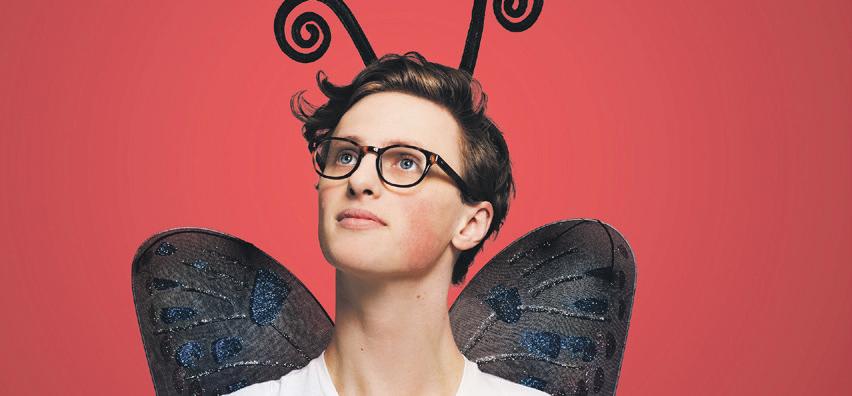
is handed down in tablets from the ancients:
Stop worrying and learn to love the rot.
Your halls are going to get grimy. The bins won't get taken out when they’re supposed to be. You will have silverfish in your bathroom. These are unavoidable facts of freshers, and the sooner you come to terms with them, the easier your year will be.
Read more on page 2
Sofia Webster Co-Deputy Editor
ax Fosh is an ideas man who follows through. From writing ‘Welcome to Luton’ for passengers as they land at Gatwick Airport to cooking a meal in an active volcano, Fosh is like a medieval jester with a camera. Epigram recently spoke with the comedian ahead of his 'Loophole' show in the Bristol Hippodrome to find out more about what goes on in his weird, wonderful mind.
2
















3
Everyone’s just as confused as you are.
When you first step onto campus, it’s easy to feel like everyone else has it all figured out - But here’s the secret: most people are just as lost as you. The key difference? Some have mastered the art of faking confidence. Take comfort in the fact that it’s totally normal to feel out of place, but embrace the confusion as part of the experience. It’s how you learn, grow, and eventually, you’ll find your stride.
start to feel like a minor hurdle compared to the benefits of staying on top of your studies. Embrace the climbs as part of your academic journey. Your legs – and your grades – will thank you.
Co-Editors-in-Chief: Amaan Ali and Annie McNamee
Deputy Editors: Sofia Webster and Will Standring
2
Punters in clubs are good for free drinks, not for taking home. They may look good under the sweaty, drunken lights of Lizard Lounge, but they are not going to be your future spouse. Plus there’s nothing more annoying than waking up hungover with a mediocre man in your bed. Bonus points if you’re a fresher and he’s a third year, and bonus bonus points if he has a mullet. Sorry lads.
Fosh is most widely known for his Street Smart interview series, where a video of him mistaking a pomegranate for a grapefruit went viral. Since then, Fosh has grown a global audience of over 4 million YouTube subscribers. He is no stranger to performing in Bristol, having previously done so on his ‘Zocial Butterfly’ Tour (2022), stopping at the Hen & Chicken in Southville as one of the performances. Some of Fosh’s most popular content involves pulling off the most wacky and creative stunts, often involving working out a kind of 'loophole'. Max explained how this new tour originated from an idea he had 6 months ago, which ultimately turned into an international tour. Despite our conversation about his upcoming tour, it would be a wasted opportunity without mentioning his timeless ‘I don’t know my fruits’ video, which has garneredmillions of views on TikTok and counting.
4Beware: the hills. While skipping a morning lecture might be tempting when faced with a steep climb, it's worth the effort. The trek up those hills not only gets your blood pumping but also gives you a chance to mentally prepare for the day ahead. Just remember to master the art of pretending you're not out of breath when you finally reach the top and walk into the lecture hall. Plus, being present in lectures helps you grasp the material firsthand, engage with the content, and clarify any doubts on the spot. Over time, those hills will
Speaking on his viral video success, Fosh shared that it came about on a night where he and his producer were not having much luck finding people that wanted to be filmed, by chance he saw Eleanor, a sister of a friend of his, who agreed to be a part of the video and the rest is history.
A few months later, TikTok arranged for them to reunite for another video, giving them an opportunity to reflect on their brush with virality. We joked about a false conspiracy theory claiming they had dated, but he was insistent this wasn’t true.
Max Fosh is an example of a comedian that has crafted an immensely successful career with the help of the Internet to make world class video comedic content, that has coincidently reached viewers and fans from all over the world. Fosh’s niche was not something he had intricately planned, 'it is a challenge,
And there’s tons more where that came from. Throughout these pages you will find the combined wisdom of dozens of writers, each with their own unique take on student life –we are like an ancient oracle, if it knew its way around the Arts Complex. Epigram is the place that will bring you news that you need to make sense of the world as it hits students hard, we will allow the opinions that matter to have space, not the white noise that pollutes, and we’ll be a friend at the ties when you need us.
We can’t wait for the year ahead, and we hope you’ll join us to keep on top of breaking news, find the coolest new music venues, and fully immerse yourself in everything Bristol has to offer. Find us across campus monthly, or on Instagram, TikTok, and Twitter for more timely updates. Whether you’re a reader, a writer, or just a curious mind, we can’t wait to meet you.
finding out what works.' The process of developing an online niche means giving the audience so much power. It is therefore a journey of figuring out what works best for you and your audience and evolving with that, and that ultimately for any aspiring comedians, the best time to start is right now. Adapting from video content to performing live on stage will come with challenges, as it involves adapting to a different medium and means there is 'no hiding, you are always receiving immediate feedback from your audience.' Nonetheless, it's a challenge he's excited to meet head on.
News
Co-Editors: Josie Hodgson and Maud Humphries
Co-deputy Editors: Rhiannon Jenkins and Beatrice Learmouth
Investigations
Editor: Will White and Sofia Lambis
Subeditors: Otto Proctor, Cerys Larsen
Opinion
Editor: Karen Mends
Co-Deputy Editors: Alex Creighton and Hannah Moser
Subeditors: Ellen Jones, Riana McConochie
Features
Editor: Nel Roden
Co-Deputy Editors: Jessica Cohen and Daisy Yates
Investigative Corrospondent: Benedict Chester
Subeditors :Reuben Kerbes, Illona Hoffman
Arts
Editor: Bruno Bridger
Co-Deputy Editors: Elizabeth Abbott and Ella Heathcote
Correspondents: Patrick Chandler and Julia Anna Masluszczak
Subeditors: Eve Davies, Bobbi Carsley
Film & TV
Editor: Max Bradley-Cole
Co-Deputy Editors: Meadow Wattret and Chien Wen Sow
Subeditors: Nadiya Jackson, Marianne Chatburn
Music
Editor: Benji Chapman
Co-Deputy Editors: Aditi Hrisheekesh, Megan Foulk
Subeditors: Amelie Peters, Sophie Scannell
Sci-Tech & Gaming
Editor: Corin Gabriel Hadley
Deputy Editor: Miles Gilroy
Subeditor: James Lewis
Sport
Editor: Faniki Deche
Deputy Editor: Sean Lawrenson and Adam Mountain
Subeditor: James Lewis
Lead
Want to write for us? epigram.org.uk/get-involved/
Follow us on:
Co- Editors
Josie Hodgson and Maud Humphries
Beatrice Learmouth and Rhiannon
Jenkins
Will White and Sofia Lambis
Otto Proctor and Cerys Larsen
The 4th July 2024 saw a landslide victory for Sir Kier Starmer's Labour Party, defeating the Conservatives after their 14 years in Government. But how did Bristol vote in the recent General Election?
Maud Humphries News Co-Editor
Results in the five Bristol constituencies, Filton and Bradley Stoke, saw four Labour holds, one Labour victory from Conservative, and one Green Party victory from Labour. The individual constituency results were as follows:
This was one of four seats won by the Green Party.
Bristol East: Labour hold A turnout of 61.9%, saw a Labour hold of the Bristol East seat, with Kerry McCarthy being re-elected.
Bristol North East: Labour hold A turnout of 60.2%, saw Damien James Egan elected as MP for the Labour Party.
Bristol North West: Labour hold A turnout 65.1%, saw a huge victory for the Labour Party's Darren Jones.
'A turnout of 69.4% saw Denyer gain the Bristol Central seat from Labour'
Bristol South: Labour hold
Bristol Central: Green Party gain
A turnout, well above the national average, of 69.4%, saw the Green party's Carla Denyer gain this seat from a previous Labour strong seat.
The lowest turnout out of the Bristol constituencies at 57.7%, saw Labour's Karin Smyth re-elected as MP.
Filton and Bradley Stoke: Labour gain
This constituency saw Labour gain 9.7% of the vote
share, and a 25.4% loss from the Conservatives.
A turnout of 65% led to Claire Hazelgrove being elected as MP.
Epigram interviewed Green's newly elected Carla Denyer for Bristol Central pre-election. The co-leader of the Green Party highlighted her priorities to addressing the housing crisis in Bristol, experienced heavily by students, the mental health crisis, and her party's stance on the Israel/Palestine conflict. Last term, students at the University of Bristol created an encampment which was active for over 2 months, protesting for the university to cut its ties with Israeli arms manufacturers. When asked, Denyer reiterated her party's calls for a ceasefire in Gaza, and supporting the protest, citing it as an integral part of a healthy democracy.
Alongside Starmer's victo-
ry, a big story of the election was the success of Nigel Farage's Reform UK Party. Despite winning only 4 seats, Reform's percentage of the vote share was at 14%, reflected in 1% of the seat share.
In comparison, the Conservatives won 24% of the vote share reflected in 19% of the seat share.
Both Reform and Green were impacted by the UK's First-Past-The-Post. Sys-
tem, which meant their number of seats in Parliament disproportionately reflected their percentage of vote share. Another important statistic of the election was the percentage of vote share falling for Labour significantly in large Muslim communities, falling about 23 points to 39%. This has widely been attributed to their stance on the Israel/Palestine conflict.
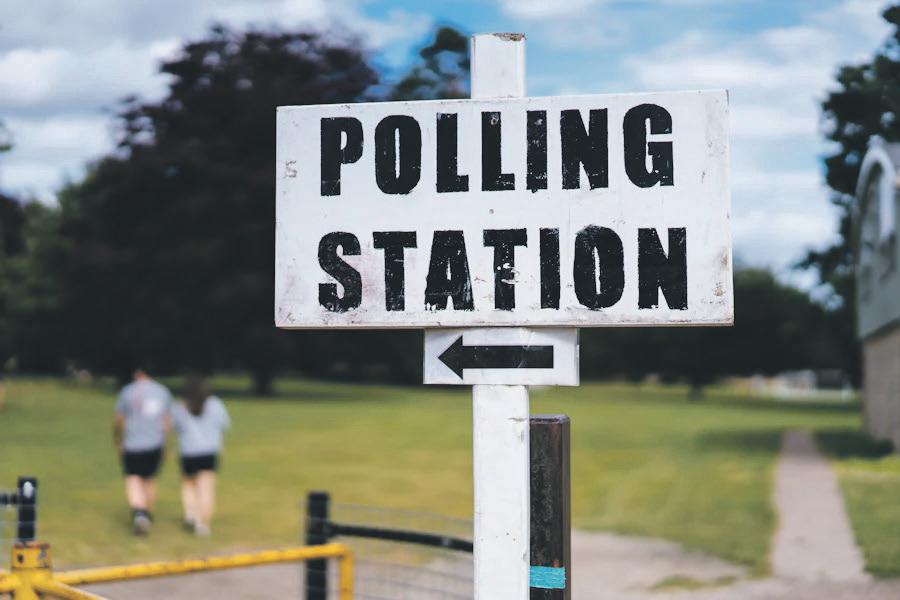
The UK's higher education sector may face significant financial blows as the number of international students enroll-
Rhiannon Jenkins
News Co-Deputy Editor
Recentgovernment data has revealed a concerning trend for the UK's higher education sector, with a sharp drop in applications for study, skilled worker, and health and care visas from workers and their family members.
Data shows such applications fell by more than a third
in July 2024 compared to the same period last year. This decline appears to be exacerbated by government policies that have restricted international students and health and care visa holders from bringing family members.
The previous Conservative government introduced these restrictive policies, and the current Labour government has not yet indicated any plans to make any changes to them.
The Home Office's initial figures reveal that sponsored student visa applications dropped by around 15% from July 2023 to July 2024. This
comes in contrast to the record-high levels of international student enrolment universities experienced in 2022, of which are likely to ensure international student enrolment continues to remain above pre-pandemic levels.
The financial implications of this decline are significant. Since 2016, the £9,250 annual tuition charged to UK home students has seen its real-term value decline to the equivalent of approximately £6,000 due to recent surges in inflation. This has made universities increasingly reliant on tuition fees
From Tuesday 23 July to Thursday 1 Aug 2024, the bi-annual graduation window saw thousands of students officially graduate on campus in the Wills Memorial Building, live-streamed from the Richmond Building.
Josie Hodgson News Co-Editor
Accompanied by two guests each, new graduates took up their opportunity to participate in the prestigious endof-degree ceremony, involving the individual procession in the renowned Wills Memorial Building, which was opened by King George V and Queen Mary in 1925.
Professor Judith Squires, Deputy Vice-Chancellor and Provost at the University of Bristol, congratulated this year’s graduates, celebrating their ‘intelligence, hard work and tenacity’: ‘Gaining a degree is a significant achievement. We are proud of each and every student who crosses that stage.'
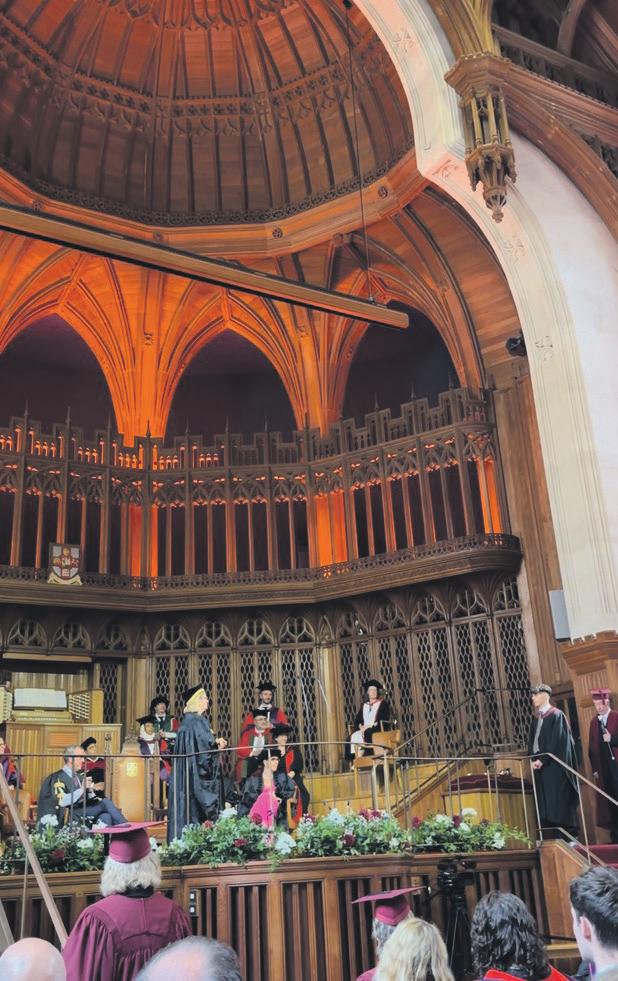
paid by overseas students, rendering them vulnerable to fluctuations in their international student populations.
The University of Oxford's Migration Observatory has cautioned that the drop in international student enrolment could force universities to make difficult "trade-offs" as they grapple with dwindling revenues. This concern is echoed by reports indicating that at least 67 educational institutions are already undertaking redundancy and restructuring initiatives, which pose the threat of heightening risks of increased labour disputes.
According to recent analyses by PwC and the OfS, the higher education regulator in England, as many as 40% of the country's universities are expected to operate at a deficit in the coming year.
This is a worrying prospect, particularly as the impact of recent nationwide anti-immigration riots on international student enrolment remains to be seen. What is clear, is that this impending financial crisis poses a significant risk to the quality of education and the overall well-being of the UK's higher education system.
‘From me, and everyone here at the University, a huge well done to everyone who has just graduated.’This year’s graduation adopted a contrasting tone to the winter graduation last December, largely dominated by controversy following the University’s removal of the UK national anthem from future ceremony programmes, sparking debate online - most notably from Sir Oliver Dowden.
officially graduated after 41 years this July, following an unpaid accommodation bill of £64.80 which had prevented him from graduating previously. The bill, caused by an unruly pet parrot, has now been written off by the University.
'A number of student stories made headlines in major news outlets, including the Guardian and BBC News'
This summer, the resilience of Bristol students was instead front-and-centre, with a number of student stories making positive headlines in major news outlets, including The Guardian and BBC News. Carter Clothier, Biology graduate, was one such student whose joint graduation with his father made the news. Carter’s father, Jonny Clothier,
Speaking with Epigram, Carter explained why it meant so much to him to graduate alongside his father. ‘It was amazing to graduate with my dad … it was important for us as a family, because all of us have gone to Bristol and it was great for my dad to finally close out our years of study’. Resilience was further embodied by many of this year’s new graduates who belong to the 2020 and 2021 cohorts, arriving following a tumultuous and uprooted Sixth Form experience caused by Covid-19 lockdowns. Accompanying this, as with much of the rest of the world, post-Covid ‘hangovers’ resulted in many of these student-turned-graduates having experienced online learning, and initially even isolation stints, in their first year. For Thomas Osborne, Biomed graduate and
incoming Masters student in Bristol, this graduation was a celebration of his degree in spite of the restrictions which remained throughout his first year. ‘Involvement with people in my course I felt was hampered by […] pre-recorded material’, whereby ‘valuable social aspects of meeting course-mates’ were lost, Osborne said. ‘[Graduation was] probably the most rewarding part of my course… [it was a] celebrati[on of] all the work [I] put in.’ This sentiment was echoed by fellow Biomed graduate, Niamh Kathrens, who described how graduation served as an opportunity to come together with friends and family to celebrate determination in an unprecedented context, especially after an ‘isolating’ first year. ‘[I felt] so many different emotions … [it was] honestly one of the best days of my life. ‘It was full of love, and we were all so proud of each other, and so happy that we got to share the day together celebrating.’ Whilst many of the graduating students have completed their studies for a 'typical' three or four year degree, the week of celebration also involved students who had been studying for periods beyond this frame.
Xander Van der Poll, medical school graduate and now Doctor, graduated after seven years of study. Following an accidental fall from a tree, Van der Poll became paralysed from the waist down, resulting in him needing to take his first year medical exams from a hospital bed. In conversation with Epigram, Van der Poll spoke on his journey to graduation. ‘It means a lot to be celebrating …it's been a very rough and long road through medical school and Bristol. It’s funny looking back to where I’ve come from and to where I am now. ‘Staying positive through these times was tough, but I took each challenge as they came… if I was having a bad day, it wasn’t because I was in a wheelchair … it was because
'Staying positive through these times was tough, but I took each challenge as they came'
would not believe you at all. ‘If you allow yourself to see where the journey takes you, and seize all the opportunities that you get, life can be so amazing and beautiful. 'As the new student cohort adapt to their homes in Bristol, the recent graduates have set the tone for future students, embodying the determination and persistence shown year-onyear by Bristol students. Whether navigating a world recovering from a deadly pandemic, adapting to a new disability, or even graduating decades later, Bristol students have shown tenacity throughout all contexts.
I am human. ‘Everyone struggles and everyone has bad days. Isolating each challenge allowed me to [...] get a sense of perspective.’
With Xander now training for the 2028 Paralympics, alongside his work in medicine, he spoke on how he hopes to inspire others. ‘I want to put out a message of hope. ‘If you told me after graduating that a) I'd be in a wheelchair, I'd be horrified; But then b) that I’d be training to compete in the Paralympics, and running quite a successful Instagram page, I
When asked for advice for current and future Bristol students, Kathrens said: ‘The world is yours, literally. When you graduate you will feel so many different emotions. A sense of sadness that you are leaving the best years of your life, living away from home with all your best friends you have made. But also immense happiness that you will have a degree at the end of it.’ For newly graduated students, the Alumni network offers an opportunity for students to remain connected with peers and previous students. For more information, visit https://www. bristol.ac.uk/alumni/.com.
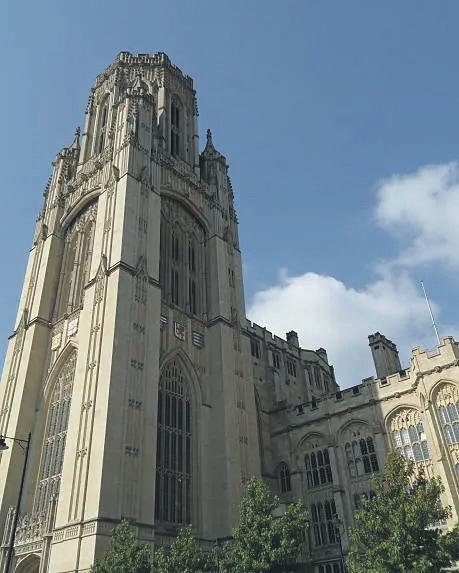
Thousands of anti-fascist counter-protesters gathered in Old Market and the surrounding area on Wednesday, August 7th, amid threats of further violence by right-wing rioters following widespread violence up and down the country.
Will White News Investigation Editor
Counter-protesters vastly outnumbered any right-wing presence, and avoided violent scenes as seen in other cities across the country.Those present at the scene described the turnout as a ‘victory’ and praised the sense of ‘unity’ among the community. Many held signs reading slogans such as ‘immigration built our nation,’ ‘Bristol welcomes refugees,’ and ‘Keep Bristol Anti-Racist.’
Bristol. Many premises in Old Market boarded up their windows as a precaution, and other businesses across the city issued warnings to staff about traveling through the city. ‘It’s been dead [since 15:00],’ said Leila, assistant manager at Rough Trade, a record shop on Nelson Street. ‘There’s a weird feeling in the air.’
granted enhanced stop and search powers. ‘They saw what happened [on Saturday],’ said one protester, who wished to remain anonymous. ‘They didn’t want to come back.’
'‘I feel so supported. I feel like I belong.’ ‘Bristol is for everyone.'
Counter-protesters vastly outnumbered any right-wing presence
Members of the local community, students, and social activists, began gathering around 19:00 following rumours and claims that right-wing groups would target immigration lawyers in cities across the country, including one on West Street,
The nationwide riots began following disinformation spread online about the identity of the Southport attacker, who murdered three children, and injured ten others, in a knife attack on the 29th July this year. Far-right groups and commentators used speculation as to the identity of the attacker to incite hatred online, claiming that he was an ‘illegal migrant’ and ‘alleged to be a Muslim.’ Preparations for the expected violence included hundreds of paramedics on site, and police officers
'Not everywhere might be as lucky as Bristol'
Afrin, a UWE student who showed up to support, said she was ‘surprised and amazed’ by the turnout. ‘I’m not a native Brit; this is all so close to my heart and that’s why I’m here today,’ she said. ‘I feel so supported. I feel like I belong.’ ‘Bristol is for everyone. It’s our Bristol,’ she added. Chris Roche, Regional Organiser for UNISON South West, was also present at the counter-protest. According to Roche, there is ‘power in unity and community.’ ‘There are hundreds of workers from UNISON out today protesting against the violent far right,’ said Roche. ‘Whether it’s public service workers or communities facing abuse, together we have the power to push back and make this society more equal for everyone.’ ‘In Bristol itself and elsewhere people are
saying ‘no, we are not going to tolerate racism and fascism,’ he added. ‘We are not going to stand by while the far right attacks our friends, neighbours, families, public service workers, or the most vulnerable people in our communities.’
While courts across the country continue to prosecute those involved in the violence, police forces nationwide remain on high alert for further unrest, such as the subsequent violence in Belfast. When asked about
how they felt about the prospect of further violence, protesters remained optimistic. ‘I think everyone will show up,’ said Lewis. ‘Everywhere will have a counter-protest bigger than a protest.' According to Afrin, ‘it’s OK to be afraid.’
‘Not everywhere might be as lucky as Bristol,’ she said. ‘But I would like to request for everyone to look out for each other. You don’t need to be violent, but speak up.’



After nightclub Gravity’s shock closure back in April, student sports night Fishies has been relocated to The Brass Pig and Daisy’s for the new year. The event will take place on a Wednesday night as before, but will take on a slightly different format from previous years.
Beatrice Learmouth News Deputy Co-Editor
Speaking to Epigram, Fishies organisers confirmed there
would be two events: ‘Brass Fish’ at The Brass Pig, and ‘Fishco’ at Daisy’s. ‘Brass Fish’ will be largely similar to the original format in Gravity with the upstairs becoming a silent disco, and downstairs being comparable to Gravity’s main room. ‘Fishco’ will take place across the street at Daisy’s and ‘will be playing disco, cheese and house music.’ When asked about the costs of the night in comparison to previous years they confirmed that, ‘the entry and the drinks tariff will be a student tariff that will be the
same as before.' They will also have ‘two dates at SWX per term where all sports teams will come together’ following the success of the SWX show on the 29th of May last year. The first of these will be held on the 25th of September.
'This decision has sparked controversy amongst some of the student body'
After Gravity’s closure, Fishies was held several times at Lola Lo’s at the end of last term. However, they decided to permanently move
its location to The Brass Pig as ‘people love the venue and it’s in a location very accessible to UOB students.' This decision has sparked controversy amongst some of the student body as The Brass Pig is less like a traditional night club, being much smaller than Gravity and resembling a bar.
In their announcement on Instagram, Fishies organisers
acknowledged the venue is ‘different from Gravity,' but they were keen to keep the event on the ‘sacred triangle.' The inclusion of Daisy’s is likely to dispel some of this criticism as it enables more people to attend the event and gives students and societies more flexibility. Daisy’s is a 70s bar that opened back in June and it has already gained huge popularity amongst students following the nightclub, Mbargo’s , closure.
Editor
Karen Mends
Co-Deputy Editor
Alex Creighton
Co-Deputy Editor
Hannah Moser
Subeditor
Ellen Jones
Subeditor
Riana McConochie
Nowadays, it's easy to sit back and watch political events unravel without considering the impact students can have through our involvement. However, student protests still play a significant rule in instigating change.
Alex Creighton, Year 3, Politics & International
Relations
Student politics is important.
A scan of the headlines or a flick through history books will show you how true this is. In the last month, Bangladeshi youth and student groups successfully deposed the autocratic leader Sheikh Hasina. In the last year, we’ve seen a global outcry from students and many others against Israel’s war in Gaza. This century, the Occupy movement, the Save Darfur Coalition and countless other acts of collective student resistance have helped push back against government mismanagement, discrimination, violence and injustice. Student politics can be effective, exciting and emancipatory. Student
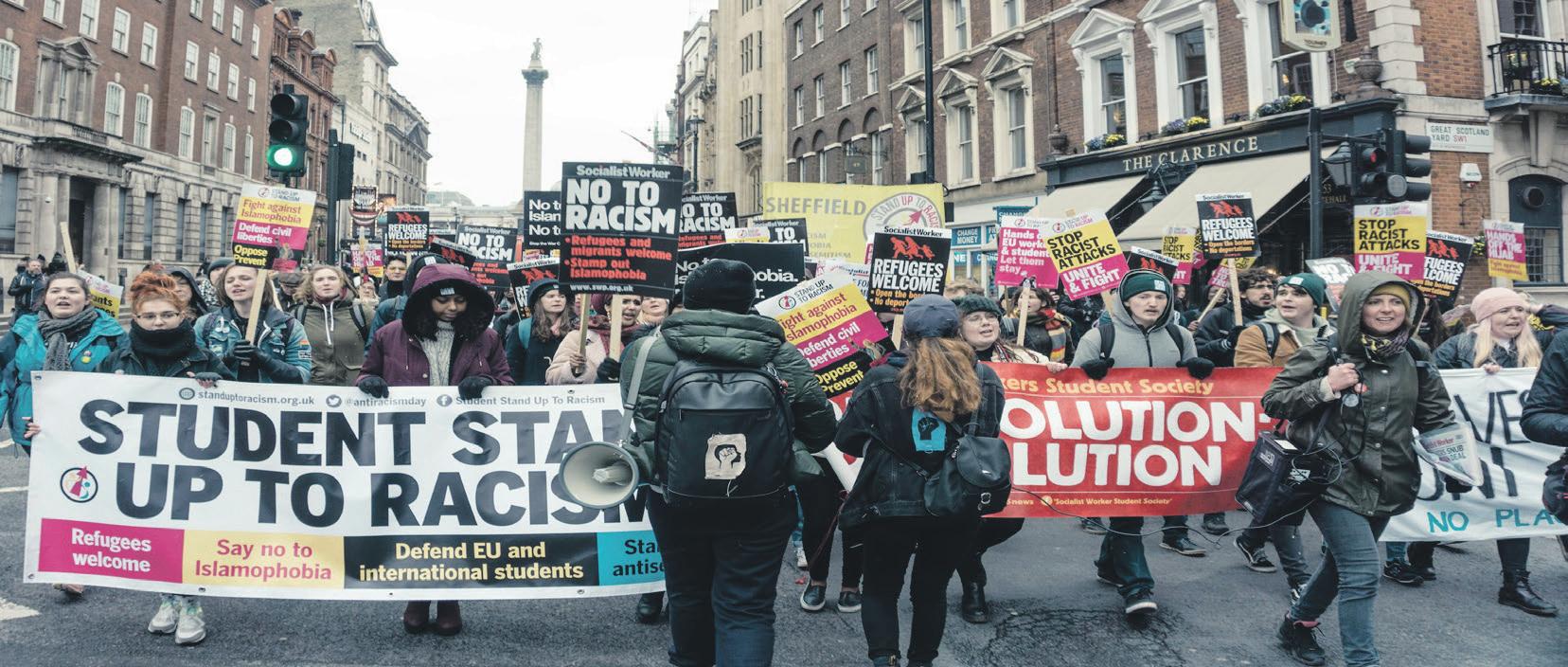
politics is important. This much is clear. But that doesn’t mean it’s straightforward. In this article, I’ll tell you why you should get involved despite apparent complications and provide a three-step guide to what makes effective and well-thought-out student activism.
Firstly , let’s deal with these complications head-on. Are they so significant that

students should think twice about organising behind a common cause? In media, conversation and literature we often see student protest portrayed as a negative force; protest is disruptive, violent and disorganised. This narrative can complicate altruistic motivations we might cite as reasons for activism, making getting involved more complex.
But these narratives aren’t the whole picture. Let’s take a closer look. Media outlets provide us with a great deal of the information we consume about the world. As a result, they play a large part in creating narratives about activism. These outlets also make money through clicks, creating a formula which incentivises sensationalism. A case in point is the social movement Black Lives Matter (BLM). BLM protests in 2020 received greater coverage on the occasions when violence occurred than their many peaceful demonstrations. The media didn't cover the hours of stakeholder meetings, peaceful marches and years of grassroots organising that never culminated in confrontation. In other words, we’re
Some may argue that free speech has become a limited phenomenon in today's world. However, is freedom of speech really under threat or are we as a society clapping down on the spread of disinformation?
Luke
Buckland,
Year
2, Politics & International
Oprovided with the narrative that student activism- and political activism more broadly- is characterised by violence and disruption when the truth is far more nuanced. So, whilst we might be told stories about how negative and violent movements like these can be, we shouldn’t always believe them. Understanding this helps paint a more accurate image of political involvement. Not violent but deliberative.
'More excitement means more views which means more eyeballs on more adverts. This means that the protests covered by the media are usually the most disruptive ones.'
So if you have an issue you’re passionate about, or see a problem you think needs solving, you shouldn’t let bad press put you off. Instead, you- or rather, we- should get involved and get our voices heard.
But what does ‘getting involved’ look like, and how can we navigate the complexity of the political world? Here are a few tips. Activism is best practiced when well thought out. That’s why education should be the first step of political involvement. This can take many forms. Education can be found in the pages of books, the columns of a newspaper or the frames of a video. Regardless of how you go about it, the goal should be to become better
informed about the issues you care about. But education is a process, not a goal in itself. At some point, you have to take your knowledge into the world and see how it compares with other people’s understanding. To do this, you have to organise with others. Here you can build solidarity, be part of a community and continue to develop knowledge through action. Perhaps a discussion group, political party, charity or student society will be your platform.
The final step is reconstruction. Reconstruction means putting your ideas into practice and enacting the change you want to see. What this looks like isn’t for me to say, but for you to decide. Educate, organise, reconstruct. This mantra provides a rough guide to getting started with student activism, but the rest is up to you.
Image courtesy of Unsplash

n the 16th of August 2024, Kieran Usher became the first adult in the United Kingdom to be charged with a riot offence. No such historical firsts are to be expected when dealing with disinformation which has fuelled violence during the recent riots. This fact demonstrates that free speech is not under threat. If anything, what we need is more control over the spread of disinformation.
Defined by MerriamWebster, disinformation is information ‘deliberately and covertly spread in order to influence public opinion'
Cases like Kieran Usher’s seem relatively unsurprising. The police and justice system dealt with riots in 2011. They have the tools to identify suspects and prosecute based on clearly defined laws. Prosecution for violent crimes is expected. Cases are largely relatively straightforward. Cases are largely straight forward however in the 2024 riots disinformtaion has wdiely been seen as a catalyst for violence. Where there has been disinformation directly causing violence or harm, there have been arrests. But it is disinformation which does not directly cause harm that is more dangerous as it is less likely to be dismissed as inflammatory. It is this rhetoric online that shows that free speech is not truly infringed upon.
Consider the disinformation which was spread in an attempt to identify the attacker in the Southport stabbings. Bernadette Spofforth posted on X that the attacker was ‘Ali Al-Shakati’, labelled a Muslim asylum seeker who arrived on a small boat and holds a place on MI6’s watch list as a terror suspect. She was arrested and bailed on suspicion of
stirring racial hatred through false communications, pending further enquiries. Her arrest, along with others for crimes online, are part of what Edward Grange (a criminal defence lawyer) considers the Online Safety Act’s ‘first significant test’. This misidentification of the Southport attacker did have a significant impact on the violent disorder which followed in the last three weeks. However, it was not just due to Ms Spofforth’s post. Channel3Now followed up with a story that also identified the attacker as ‘Ali Al-Shakati’. The seemingly reputable news page no doubt garnered legitimacy to the story and gave disinformation traction in social media spaces. And yet no one at Channel3Now has been arrested. This simple fact highlights the limiting practical realities that uphold free speech and limit persecution. First, there is the simple fact of geography. Their main office is reported to be in the United States. This makes charging anyone at Channel3Now as culpable for violence in the UK increasingly difficult, as to commit an offence under the Online Safety Act 2023 you must be a habitual resident in the UK. The same problem occurs with popular commentators. Renowned podcaster Joe Rogan posted about 4000 arrests in Britain likening them to ‘thought police’ in Soviet Russia, something which Elon Musk reposted. His claims were categorically wrong, but their comments reached the front pages of newspapers nonetheless, legitimising anti-government rhetoric in the riots. Yet, as commentators from abroad they effectively cannot be reached by the law, even if the content had directly caused harm. Second, no current UK laws guard against disinformation as a lone offence. Notice that
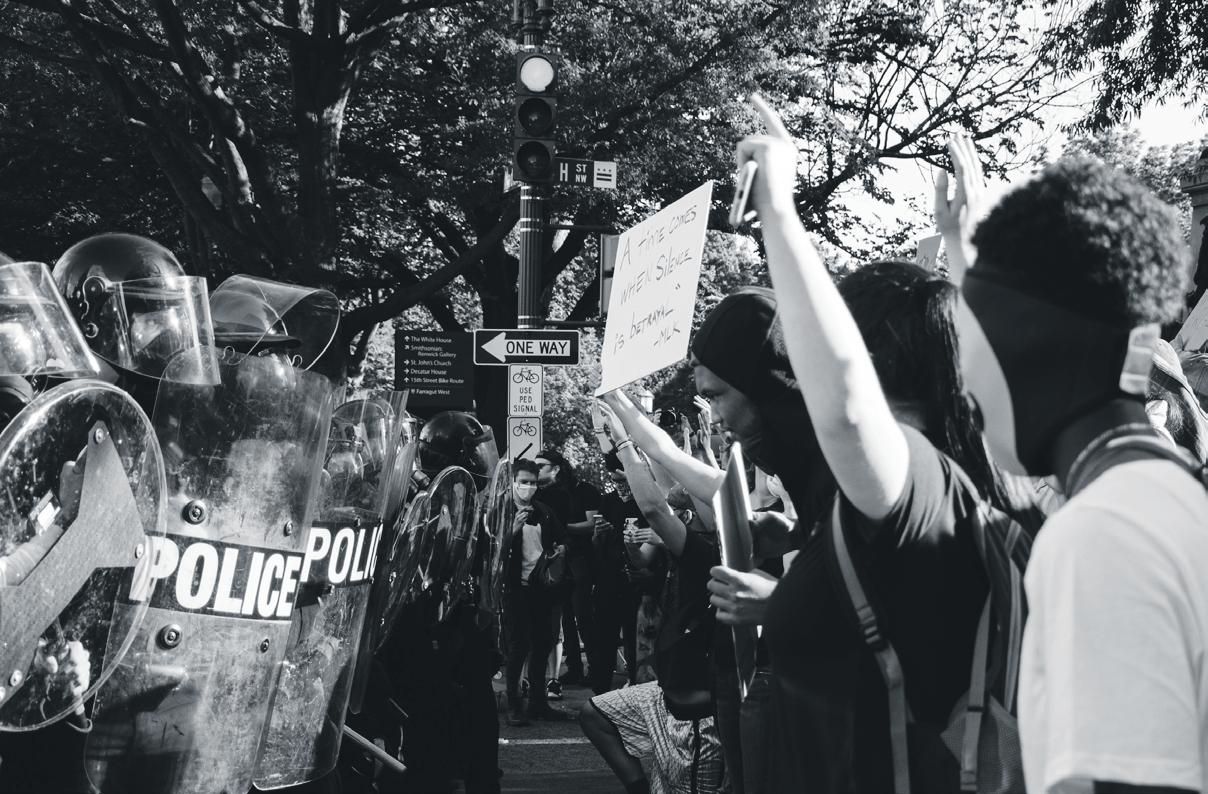
' The threat of £18 million or 10% of global annual turnover against social media companies for not guarding against this harm is significant.'
Ms Spofforth’s arrest on false communications is qualified by the fact that it stirred up racial hatred. This is a problem that the Online Safety Act 2023 does not fix. False communications must also cause ‘non-trivial psychological harm’ or threaten or cause physical harm. The threat of £18 million or 10% of global annual turnover against social media companies for not guarding against this harm is significant. But it does not force social media companies to ensure disinformation does not spread if the only crimes under the act are identified as needing to cause harm. This ultimately means that the law precludes action which might be pre-emptive in any form. This is because harm must occur first for disinformation to be deemed illegal or dangerous under the act. Therefore, any potential harm by disinformation is not combated by current UK laws.
' This is because harm must occur first for disinformation to be deemed illegal or dangerous under the act.'
down by paying for verification ticks which promote your content. This all makes for a social media platform which incentivises spreading sensationalist news stories to garner the most interactions and revenue for users. Ultimately, this means the spread of disinformation is no longer contained to the usage of powerful political actors (i.e., Russia’s role in the 2016 US presidential election).
Now any, and every, political commentator can spread disinformation with little consequence.
Free speech, in other words, triumphs over regulation of disinformation.
'In fact, you can earn money by spreading disinformation and going viral. Musk’s social media company X introduced ad revenue sharing for X account holders.'
In fact, you can earn money by spreading disinformation and going viral. Musk’s social media company X introduced ad revenue sharing for X account holders. You can double
Of course, the Online Safety Act 2023 is not totally without merits. In fact it has been used successfully against genuinely violent and hateful rhetoric online. Both Jordan Parlour and Julie Sweeney’s arrests fell under the terms of the Online Safety Act 2023, showing how a clear definition of the law online can lead to effective police work against those who commit a crime. Also, the possibility of significant fines against social me-
dia companies will no doubt grab the attention of the largest companies. But it does not go far enough. Its status as a UK law means there is little safeguarding from harmful online content spread from abroad. And crucially, without laws against disinformation, pre-emptive action cannot be taken against those who post provocative but not directly ‘harmful’ disinformation. This means there is an existing platform for all on social media to spread disinformation, with little worry of a threat to free speech. Unlike Kieran Usher’s case, there will be no symbolic charging against disinformation. What is needed now is an overhaul of legislation to match the threat disinformation holds. We need a coordinated global enforcement system, which outlaws disinformation as a lone offence. Only then can the swift and comprehensive work to stamp out riots over the last three weeks be matched by stamping out disinformation.
Everyone cares about freedom of speech and wants to make sure that it's protected. But what happens when the speech in question attacks and restricts the freedom of marginalized groups?
Daniel Gordon- Jacobs, Year 3, Politics & International Relations
Freedom of speech is one of the cornerstones of democratic societies, underpinning the exchange of ideas, the pursuit of truth, and the scrutiny of authority. It’s a liberty that allows individuals to express their thoughts, beliefs, and criticisms without fear of government retribution. However, recent debates suggest that this fundamental right might be under threat. Rather than undermining freedom of speech, the evolving dynamics of public discourse can be seen as efforts to create a more inclusive and respectful society.
this right with other important values.Yet some critics argue that we get this balance wrong, that political correctness and social media policies are silencing voices. I’d contend that these critics are wrong, and existing restrictions are necessary to promote a fair and inclusive society.
'Critics argue that political correctness, social media censorship, and so-called ‘cancel culture’ are eroding our ability to speak freely. Yet these concerns may be overstated.'
But first, let’s take a step back. To get a handle on this debate we need to know what freedom of speech is, without the jargon. Freedom of speech is the right to express one's opinions and ideas without fear of government retaliation or censorship. It is entrenched in numerous international human rights instruments, including the European Convention of Human Rights (ECHR), which documents how everyone has the right to ‘freedom of expression’ without interference by ‘public authority’. By allowing for the exchange of diverse ideas, this right is one vital for the functioning of any democrac.
But that doesn’t mean it’s without limits. Most democratic societies impose restrictions on speech to protect other important values. Hate speech, incitement to violence, and defamation are commonly restricted forms of expression. The key question is, therefore, not whether we should have freedom of speech, but how we balance
Here’s why. Firstly, freedom of speech has often been weaponised against marginalised groups, subjecting them to harassment, discrimination, and violence. By establishing norms that discourage hate speech and promote respectful dialogue, society takes a moral stance against bigotry and intolerance. This not only protects vulnerable communities but also enriches public discourse by ensuring that a wider range of voices is heard. Freedom of speech also carries with it the responsibility to consider the impact of one's words on others. Encouraging individuals to speak thoughtfully and respectfully does not equate to censorship; rather, it promotes a culture of empathy and understanding. Moral maturity involves recognising that our words have power and can cause harm, and choosing to use that power constructively. Evidence of this in action is the #BeKind movement, which gained prominence following high-profile cases of online bullying and harassment. This movement encourages individuals to reflect on the potential impact of their words and promotes a supportive and positive online environment.
Furthermore, creating spaces where everyone feels safe to express their ideas is crucial for genuine freedom of speech. If certain groups are consistently silenced or marginalised by hostile speech, their freedom of expression is effectively curtailed. By setting standards for respectful communication, we can ensure that more voices are included in the conversation. However, these arguments,
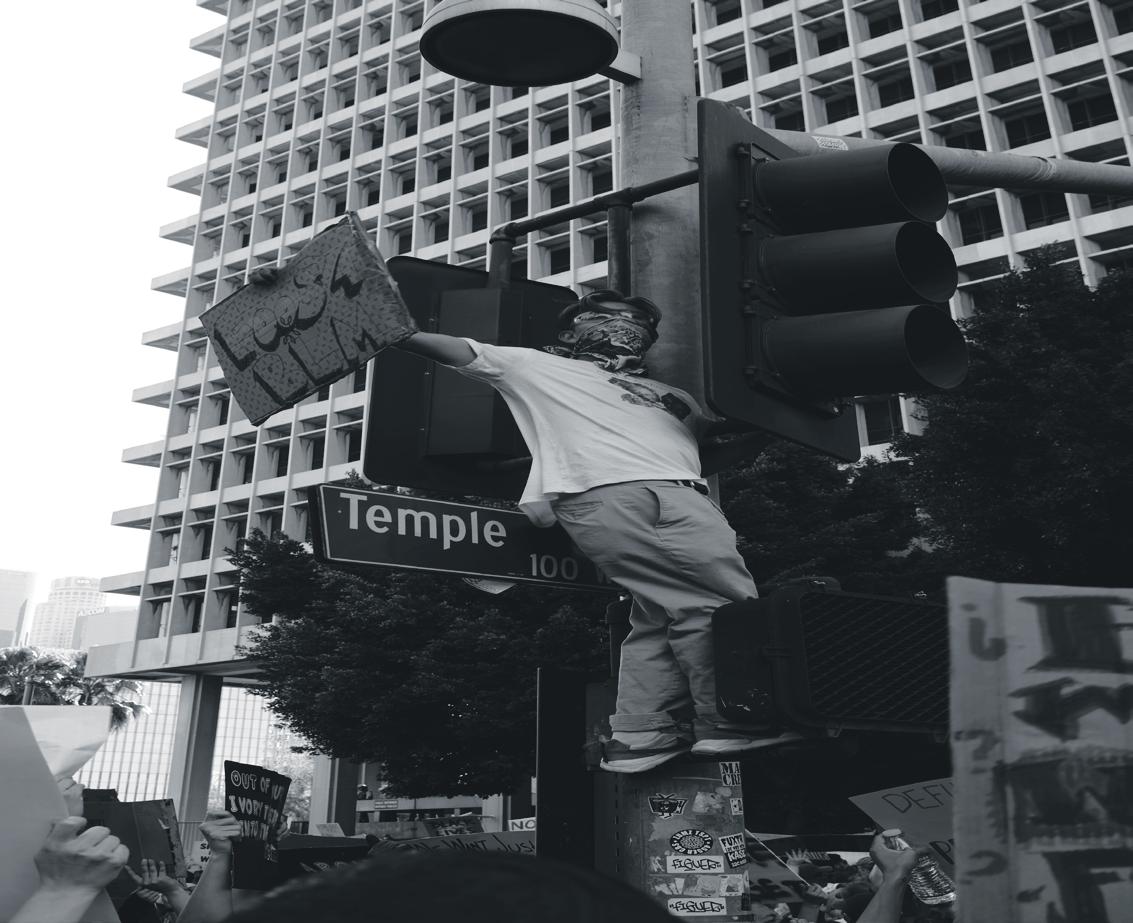
whilst important, only capture a certain aspect of this issue. When we talk about ‘speech’, we don’t just mean spoken words. The transfer of political debate into the digital realm makes this starkly obvious. Social media platforms, such as Instagram, X, and TikTok, serve as arenas where ideas are exchanged and debated on a massive scale. Social media has empowered diverse voices and movements, amplifying often neglected societal issues. It has facilitated global conversations on crucial topics such as racial justice, climate change, and political corruption. Yet, this expanded reach comes with its own set of complications. The line between free speech and harmful content can become blurred, leading to debates over what should be moderated or censored. These platforms have implemented community standards to mitigate harmful speech and foster healthier online environments. While these policies are not perfect and can sometimes result in increased censorship or increased visibility of hateful content, they intend to balance free expression to protect users from abuse and misinformation.
Cancel culture, a phenomenon where individuals are publicly held accountable for their actions or statements, is another issue. Critics claim it stifles free speech by creating an environment where individuals fear expressing controversial opinions due to the threat of being ‘cancelled’—faced with public backlash, loss of professional opportunities, or social ostracisation—which may lead people to self-censor or avoid discussing important but ‘touchy’ topics. This fear of retribution can undermine the principle of open dialogue, which is essential for democratic discourse and intellectual growth.
There is also concern that the swift, and sometimes unforgiving, nature of online reactions might not allow for nuance or forgiveness, potentially disregarding the possibility of growth or re-
demption. But from a moral viewpoint, cancel culture can be seen as a form of social accountability. When someone faces backlash for harmful behaviour or rhetoric, it sends a message that such actions have consequences. This can be a powerful deterrent against speech that perpetuates harm and makes individuals think carefully when expressing ideas and challenging debates. In sum, freedom of speech remains a cornerstone of democracy, but it must be balanced with the moral imperative to foster a society where all individuals can speak and be heard without fear of harassment or discrimination. By embracing this nuanced approach, we can ensure that freedom of speech truly benefits everyone, not just the loudest or most privileged voices.

Holly Smithurst
Fourth Year, History and Spanish Holly Smithurst discusses the benefits of joining a university society.
University life can often feel limited to two aspects: academics and drinking culture. However this year, freshers (and returning students) should be encouraged to explore joining a society - a fantastic way to meet like-minded individuals and discover new interests. Freshers Week is an exciting experience, but can also be a nerve-wracking one. While it’s widely expected that you’ll meet your best friends in lecture halls or shared kitchens, for some people this won't be the case –that's where societies come in.
A university society is a group formed by students with a shared interest in a particular area. Student Unions (SUs) at universities across the UK host various clubs or sports groups where you can become a pro-netballer, or even share a mutual love for cheese with fellow students.
The University of Bristol is home to over 400 student societies, so there is bound to be something for everyone.
Most societies meet regularly to partake in whatever their mutual interest may be, offering a great way to break up the university week and let off some academic steam. Not only this, but societies are also an opportunity to mingle with students outside of your university course and accommodation, helping you to build a diverse group of friends.
As you progress through university, you will have the opportunity to join a society's committee, allowing you to take on additional responsibilities that enhance your CV. In today’s job market, employers seek more than just a degree, so having this extra experience can significantly set you apart from other candidates.
Your time at university can be defined by the socie-
ties you join; the people you meet and the memories you make can do nothing but add to the experience. Speaking to Epigram, Charlotte Brammer, a fourth-year medic, said ‘Honestly joining canoe club in first year was the best thing I ever did. It really made my first-year experience because I made new friends and it got me out of my comfort zone’.
The Welcome Fair is the ideal place to discover what university life has to offer. At the fair, you will find stalls set up by various societies and services, such as career advice and well-being support, where you can engage with the society representatives and learn more about what their groups have to offer. Be sure to bring your Ucard (university ID) for entry, and don't forget to bring a bag to collect any leaflets or freebies! Navigating an event like this can be overwhelming. Begin by approaching the stalls that interest you the most and explore the fair from here, taking it section by section. You could even take a notepad or have your notes app at hand to jot down any important dates or information you don’t want to forget.
'Most societies have an Instagram page where they post all the information about Welcome Week and becoming a member'
hosted by societies to attract new members. It’s an opportunity to meet committee members and fellow students who are considering joining, as well as a chance to try out your chosen pastime. Many people attend these events on their own, so don’t be shy! Further information on these will be available at The Welcome Fair. Another useful tool is Instagram. You may miss a few stalls at the Welcome Fair, but most societies have an Instagram page where they post all the important information about Welcome Week and how to become a member. You'll also find information about the societies themselves here too, and even have the chance to message them with any questions. Once you’ve successfully navigated the Welcome Fair and given it a go, you will be all set to choose which societies to join.
Whether you are trying something entirely new or continuing a sporting career from home, your time in a society will enrich your experience at university immensely, offering you many more opportunities to make new friends and lasting memories.
In addition to The Welcome Fair, ‘Give it a go’ sessions are also on offer for both new and returning students throughout Freshers’ Week. These introductory sessions are events
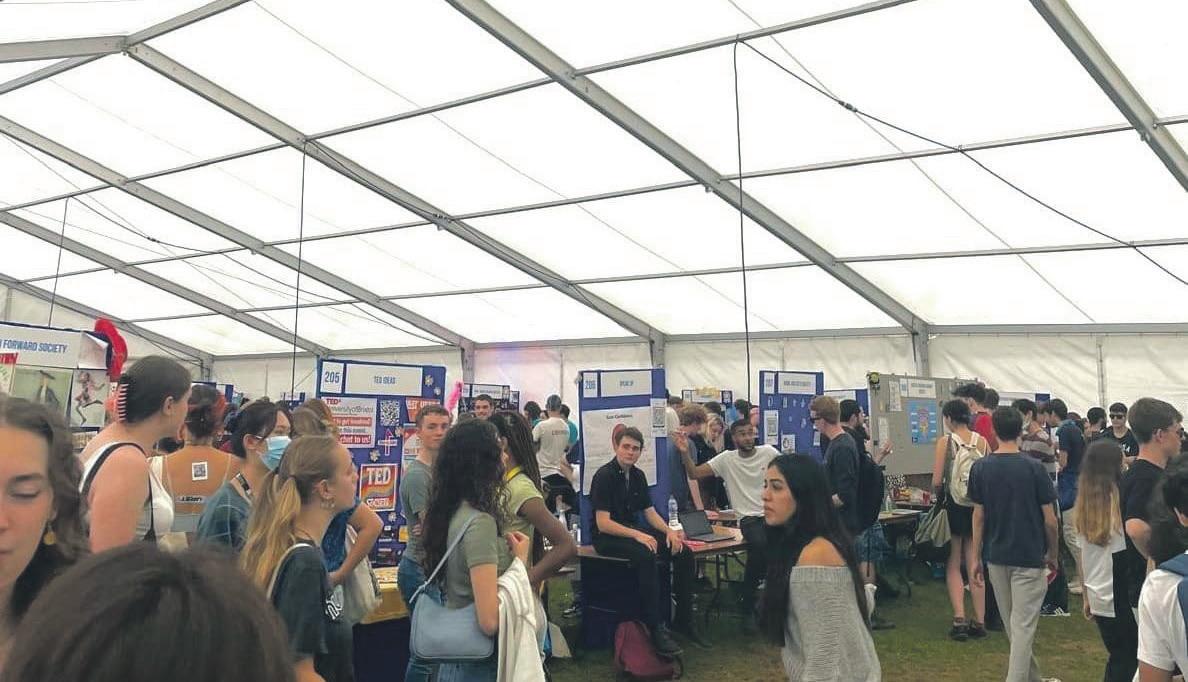
Editor
Nel Roden
Co-Deputy Editor
Jess Cohen
Co-Deputy Editor
Daisy Yates
Subeditor
Ilona Hoffmann
Subeditor
Reuben Kerbes
Features Correspondent
Ben Chester
Alannah Mylechreest delves into the importance of social spaces on campus.
Alannah Mylechreest Third Year, English and German
What comes to mind when you hear the word ‘studying’? Most likely late nights at Wills, stress levels at an all-time high, your head buried in flashcards and, crucially, alone. While solitary time to focus on your studies is undoubtedly important, collaborative study sessions with a group of friends can be just as productive and oftentimes even more rewarding.
Social study spaces are scattered throughout The University of Bristol campus, encouraging group work and communal studying, as well as functioning as areas where students can simply relax and catch up with friends.
The upcoming academic year is the perfect opportunity to explore the social spaces Bristol has to offer.
Studying with a group of friends can have a multitude of benefits; collaborative learning opens up opportunities to share different perspectives and different experiences, including new studying techniques. Testing each other on tricky concepts, discussing essay plans, or simply sharing your woes about the stresses of revision are all things that aren’t possible in the silent zone in libraries, but are encouraged in social spaces. Working as a group means that you can motivate each other as well as check up on one another’s well-being.
Martha, a third-year modern languages student, enjoyed using a wide variety of study spaces last year. She told Epigram that although no talk zones in libraries can be useful for concentrating on essays, these can sometimes feel ‘too
'he post-pandemic era has seen an increase in discussion about the lack of third spaces in modern society.'
intense’, meaning that she has recently been trying out the social study spaces for revision activities like language learning: ‘As someone who used to study independently for almost everything, it’s been so nice to switch things up recently and study with my coursemates'. The post-pandemic era has seen an increase in discussion about the lack of third spaces in modern society. The term, coined by Ray Oldenburg in 1989, refers to spaces that are separate from the home and the workplace, in which people are free to socialise in a low-pressure environment. While typical student hangouts like cafes and pubs fall under this definition, they have become increasingly less accessible, primarily due to rising prices. This issue is particularly pronounced in Bristol, which was recently ranked as the fourth most expensive city to be a student. The university’s social spaces are therefore needed now more than ever as students are on the search not only for places to study but also spaces to take a break and connect with friends. Incoming students may be wondering where to look for these communal spaces. The best place to start would be one of Bristol’s many Source Cafes, which offer food and drink at student-friendly prices. Beacon House and Senate House are two of the most popular, but there are also other cafes dotted throughout campus. Priory Road and the Biomedical Sciences Building are some excellent examples that are close to teaching spaces, giving students the chance to take a breather with friends in between lectures. Many faculty buildings have common room spaces where students (of any subject) can hang out and study. The social spaces in Woodland Road where the Faculty of Arts is based are only one example of a fantastic place to relax with coursemates. Across the road is the Hawthorns Study Lounge, a slightly smaller but no less charming location that offers a cosy atmosphere for social studying. Wherever you choose to study, don’t limit yourself to the fluorescent, no-talking zones of the ASS – give one of Bristol’s social study spaces a try!
Kashvi Cox explores the simple strategies that can ease the daunting transition into university halls.
Kashvi Cox
Second Year, English
Moving out of home and learning to navigate living independently can make the first few weeks of university seem daunting. However, it is important to remember that these first few weeks will pass, it gets easier and there is much to be excited about. Here are some tips on surviving and – most importantly – thriving during your first year living in halls. Starting university usually means August is dedicated to Dunelm trips and farewells (amongst a lot of nerves). It’s a huge mix of emotions; eager to move on with life and gain independence, yet shaking at the thought of living in a new city with people you’ve never met. There are a lot of daunting aspects to consider, many of which will be out of your control, but there are a few things you can do to get yourself off to the best possible start in your accommodation. First, let us start with the thing that is completely in your control: your room. While you may not be able to guarantee which room, building or location you’ll be allocated, you can make the most of what you get. Fill it with photos, fairy lights, fake plants (or real ones if you can keep them going!) and anything that makes you smile. You want to make your room feel like a home away from home, somewhere you’ll feel comfortable spending time in throughout the coming year. It’s also a good idea to save some space on your pinboard
‘It is a good idea to get involved with Junior Common Room (JCR) events to get to know others in your accommodation’
‘The fact that students have the option of changing their first-year accommodation is often readily overlooked .'
'It’s also a good idea to save some space on your pinboard for things you might pick up in the first few weeks.'
for things you might pick up in the first few weeks; photobooth pictures from nights out or stickers from the Welcome Fair. This way, you can begin to feel the excitement of settling into this new city, and can look forward to all the memories still to come! Perhaps your room at home hasn’t had a revamp for a while, or you have had to share with siblings. Now is the opportunity to put down your marker and go to town with the décor that just screams you. Just remember though, this room is on loan to you. Be respectful of the property and keep things relatively clean and tidy – you will only have yourself to thank when it’s time to move out in the summer. Once you’ve taken care of your room, it is time to turn to something a little less predictable – namely, new flatmates. This can be one of the biggest anxieties for new students, but everyone is in the same boat –you can use this to your advantage. Start conversations about things you all have in common, like how you’re going to decorate your room or which societies you’re interested in. Going on a walk to explore the new area or cooking a meal together are also great ways to forge connections early on. However, it is important to recognise your relationships with your flatmates might not always be smooth sailing and that is okay too, as long as you still feel safe and comfortable sharing a flat. It is a good idea to get involved with Junior Common Room (JCR) events to get to know others in your accommodation. You can find out about these by following your JCR on Instagram or by joining their WhatsApp group. Events last year included quiz nights, pottery painting
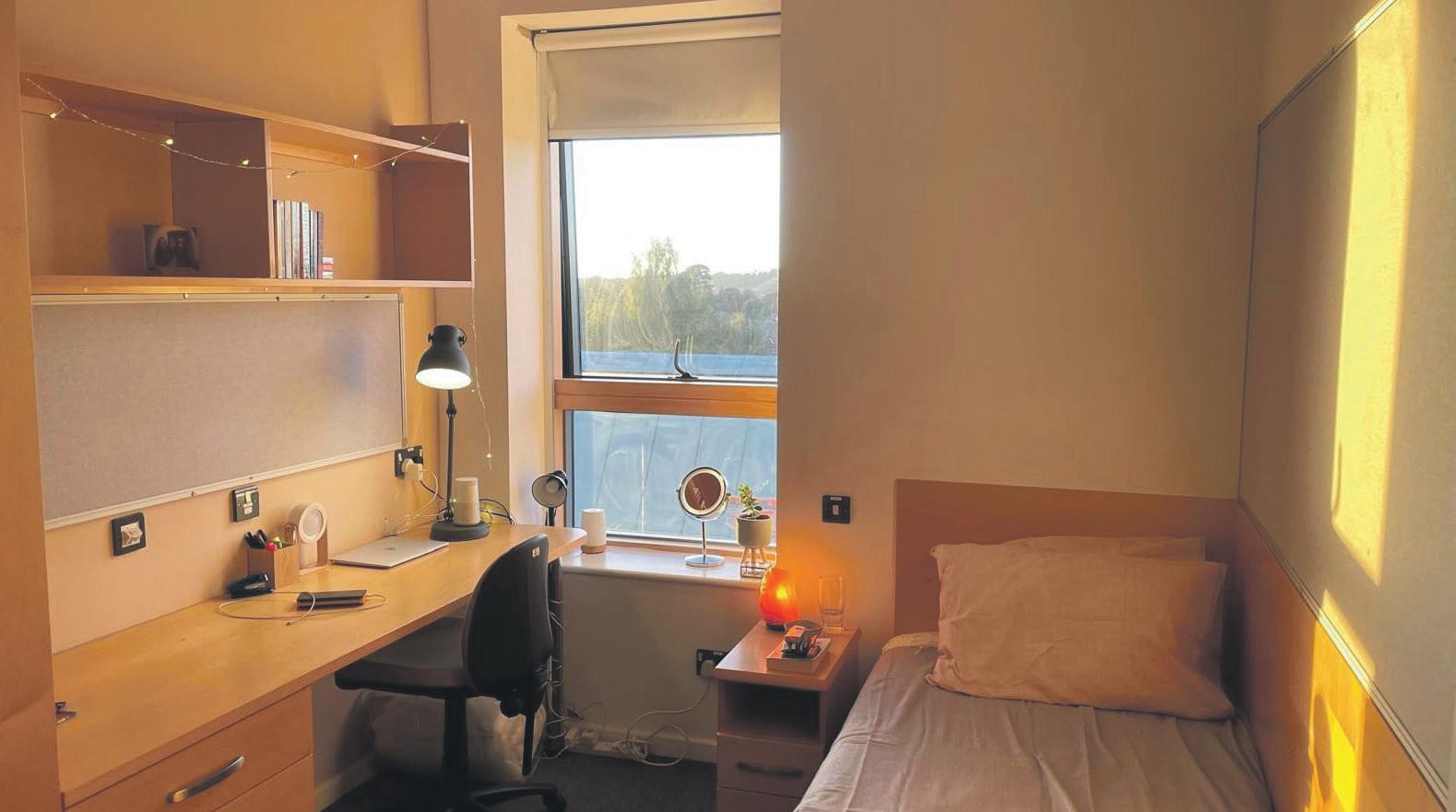
trips, and scavenger hunts. The first few weeks are a whirlwind of fun and excitement, but there are a few other important things to consider as well. Cleaning and bin rotas are two crucial matters to iron out with flatmates, and doing this early on will set you up well for the rest of the year. Katie, a second-year student here at Bristol, suggests setting up a group chat
‘Within the first few weeks because it becomes more awkward as time goes on’. While some issues are common in first-year accommodation, it’s important to remember that you are not alone if there is something more ser ous going on. Residential Life is a team of full-time, trained support staff who offer free, confidential, and expert support to all students living in University accommodation.
The fact that students have the option of changing their first-year accommodation is often readily overlooked. If you are struggling to get on with your flatmates or the location isn’t working for you then you can apply to move. Epigram spoke to Helen, a second-year Medicine student, about her experience moving accommodations... Read more at Epigram.org.uk

Emma Yeo explores how students can start the upcoming academic
Emma Yeo
Second Year, English
The 9th of September marks the start of Freshers’ week here at the University of Bristol. On social media, Freshers' Week can seem to revolve around non-stop partying and constant socialising. However, it is easy to forget that it is also an ideal time to focus on productivity and academic preparation in the week leading up to the start of term. However, with 60 per cent of students struggling to keep up with the workload, it is becoming even more important to use Freshers’ Week not only as an opportunity to engage with others but also to get back into the studying mindset.
If it is your first year at the University of Bristol, it can be useful to familiarise yourself with the different facilities available around campus –particularly the study spaces and libraries. With 14 different study venues around the city, the university has provided a helpful guide to show the location, opening hours, and resources available at each site. It is also worthwhile exploring the specific equipment and facilities at each location, from silent study rooms and group study spaces to printers and adjustable desks. Alternatively, if the university study spaces aren’t for you, check out the casual study spots that are available for a more relaxed work environment – this is also a great way to become better acquainted with the city! With impending weekly reading lists, Freshers’ Week can be a great time to start working through your assigned
texts. Most faculties send out reading lists a few weeks before the term begins, so if you find yourself with some free time during Freshers' Week, why not start reading a few pages to ease back into the world of academia? Reading lists can be long and arduous, but there are certain skills and strategies that can make them more manageable. For example, you could make notes as you read, learn to skim a text, or even explore whether chapter summaries help with retaining key points. Alongside this, it is a wise idea to establish a clear plan as to how you will take and store your notes over the year. The options are vast, with many students opting for programmes such as Notion, Microsoft Word or OneNote (as well as those sticking with the classic pen and paper). Ultimately, the choice is personal and depends on what features
Kyia Small offers a roundup of the best non-drinking events for sober students this Freshers' Week.
Kyia Small Fourth Year, English and Spanish
From seaside trips to alcohol-free raves, here’s a rundown of the best events and activities for non-drinkers within the University and wider community this Welcome Week. The new academic year brings with it a unique set of challenges, but having a social life as a sober student should not be one of them. As more and more young people are embracing a sober-curious lifestyle, alcohol-free meet-ups and nights out are now becoming popular social alternatives, and Bristol is no exception. While many of the Student Union’s 400 societies integrate sober socials, students who seek guaranteed alcohol-free
options have a choice of 101 boozeless activities to explore and enjoy. Amongst other things, you can try drum and bass boxing, part-take in a LUSH workshop and sail the harbour – but if none of those float your boat, you can always start your own. In an interview with Epigram, Eleanor, a second-year English and Classics student, vouched for the ‘café visits and walking tours, which do not involve drinking by default’ as great ways to feel included without compromising your core values. Eleanor also believed that these spaces allow students to ‘accept others without judgement and form part of a community’. For those who are not looking to try alcohol this Freshers’, why not try your hand at a new skill by signing up for the SU’s free and diverse range of Give it a Go taster sessions? After all, Bristol has been rated the 10th Best University for Clubs and Societies in the UK this year! Perhaps pub and bar crawls have become synony-
are important to you. As such, it can be useful to explore and experiment with a few different options before choosing one, and Freshers' Week is the perfect time to do this at your own pace. If you are struggling to make a decision, need advice, or simply want more information, the university has set up a site dedicated to exploring different ways to take notes, ensuring they are as useful as possible.
Freshers’ Week can also provide time to explore and learn about different study techniques and schedules. For most people, it is easy to know whether you study better in the morning or at night, and you may already know how to revise effectively from your GCSEs and A-Levels. However, this does not necessarily mean that you should stop experimenting with different study methods. There is a large variety of study techniques that
can be explored easily during Freshers’ Week. This site explores 10 different study techniques and methods, including the Feynman technique and the Leitner system. This can also be paired with the resource from the University of Bristol's study skills page, which provides further ideas and inspiration for how you can find the best techniques and routines that suit you. It is easy to find yourself overwhelmed and confused about where to start with trying to get back into the swing of academic life. Taking small, manageable steps – like reviewing your reading list or exploring new study methods – can help you gradually ease back into your routine and provide a productive way to fill those quieter moments during Freshers’ Week.
mous with university life, but the only round at Sober Circle is in the name. The founder, Sammy Hall, spoke to Epigram about how her non-profit Facebook group, which has gained 1800 members since 2019, is helping young people ‘connect [with one another] in a way that is comfortable and casual’. With a growing 18-25 demographic, Hall hopes to attract more students to her meetups with tailored events and promotions at the Freshers’ Fair. ‘I’m pleased that universities are talking about sobriety and not making everything alcohol-focused’ says Hall, ‘students should know that sober circles exist and that there are other options out there’. If a no-booze pizza night sounds exciting to you, then Sober Circle is a space where, according to Hall, ‘people of all ages and genders can meet up and have fun’. Or perhaps meeting students from around the world without the pressure of drinking is your thing? If so, then the university’s cul-
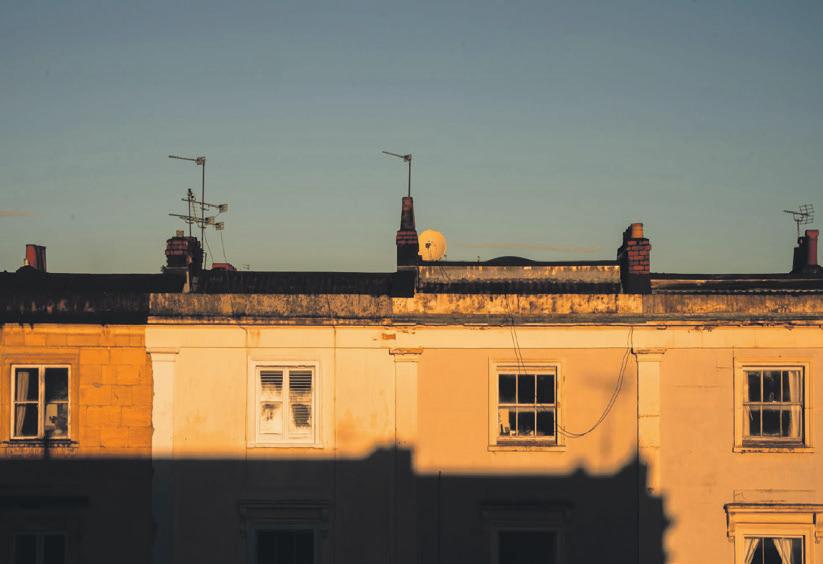
tural hub, The Global Lounge, is well worth a shot. This welcome week, the group are organising a boardgame hangout, crafts session and even a treasure hunt around the city. As alcohol-free events, students can expect a relaxed atmosphere whilst exchanging not only personal but also cultural thoughts and ideas. Alternatively, you can meet other like-minded people through the BAME, disability and LGBT+ networks where students arrange awareness events and casual socials without the pressure of drinking. For any non-drinkers who enjoy live performances and club nights, Bristol Sober Spaces
offers a refreshing new initiative. Every month, the Bristol Drugs Project hosts open mic nights with homemade food and mocktails to normalise sobriety. This August, Bristol Sober Spaces will transform the club scene with its second-ever Sober Rave at Basement 45. So, if you do not drink for religious or health reasons, preference, recovery or just sober curiosity, Sober Spaces is offering all students a night to (actually) remember. With its exclusively teetotal events and start-ups within the wider community, the University of Bristol is proving that a vibrant and exciting Freshers’ Week does not have to revolve around alcohol.
Annie McNamee Co-Editor-in-Chief
Not many of us will witness rsthand a world-changing event. Laura Trevelyan has reported on several.
IIn the three and a half decades since she graduated from the University of Bristol, Laura has had the sort of career that makes you immediately want to read her autobiography. As a political journalist at the BBC she reported on, from the ground, the IRA ceasefire in Northern Ireland, the January 6 Capitol Building riots, and day-to-day life in Gaza to name just a few.
After discovering family ties to the Atlantic slave trade, she left her full-time position as a BBC news anchor to devote more time to the fight for reparatory justice in the Caribbean. In July, she returned to the Wills Memorial Building, this time to receive an honorary degree for her work. She also has great hair. Basically, you'll want to hear what she's got to say.
Students were lucky enough to catch up with her, as we picked her brains on all things journalism, US politics, and making the world a better place for future generations. Here's five things she taught us.
1'The basics never go out of style.'
After a breezing through her BA in Politics with only minor hiccups (she originally applied to do English Literature but
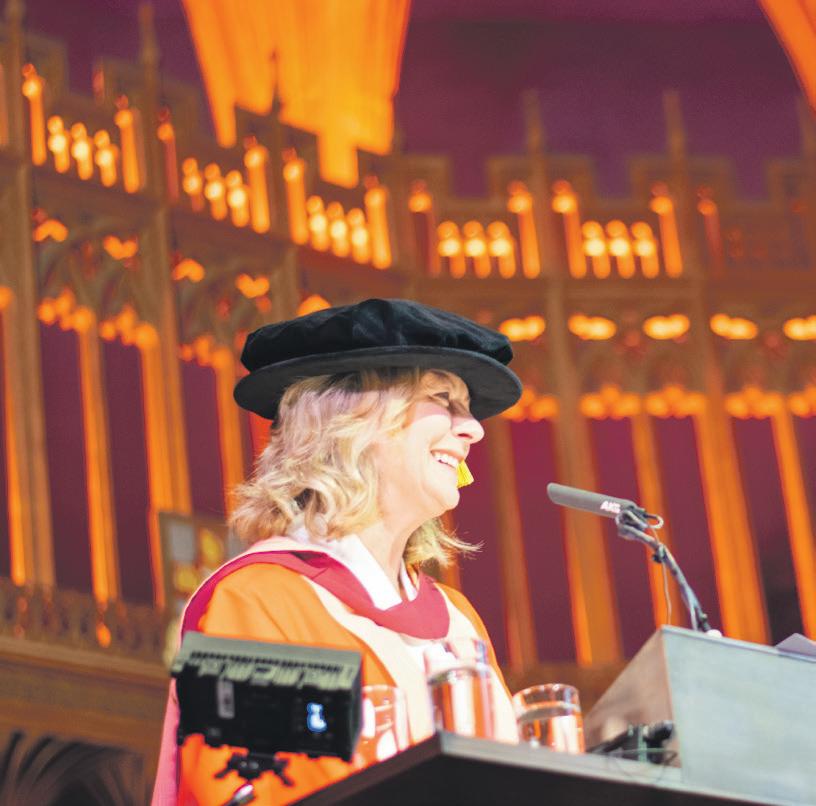
'just couldn't hack' Beowulf), Laura headed to Cardiff to complete a postgraduate diploma in journalism. Although the course was taught on typewriters, she believes that everything she learned back in 1990 remains relevant in 2024.
2'
'Get off your backsides!'
It becomes clear quickly into our conversation that Laura is essentially a journalistic sniffer dog – she can smell a great story long before the rest of us mortals have even started to look for it. And there's no excuse in her books for not chasing a great story.
'Sometimes less is more.'
People forget to ask the basic questions,' says Laura. She cautions against being overly ambitious during interviews, whether they be with regular people on the street or the Secretary General of the UN (both of which she has experience with). What should you do instead? Ask open questions, never leading ones. Never assume things about your interviewee, always go in with an open mind. And always ask the obvious – often they're the questions that get you the best answers.
4
We all need to get hobbies.
When not interviewing world leaders or campaigning for social justice, Laura tells us she plays a lot of tennis. 'Everyone needs a hobby outside of work,' she explains. After a stressful day, she finds being active therapeutic, and encourages everyone else to get involved in a sport if they can.
5
'Healing begins with acknowledgement'
In 2022, Laura travelled to Grenada, where members of her family had owned slave plantations in the eighteenth and nineteenth centuries. Local historian and expert in reparations Nicole Phillip-Dowe showed her around the island, encouraging Laura to really take in the enormity of the past. 'She wanted us to touch the torture devices they used to use on enslaved people. I was particularly upset by a flogging device used to beat the enslaved for rebelling.' Laura cannot, of course, right the wrongs of the slave trade on her own, but she believes there is power in trying 'Nicole said to me during my visit to Grenada that "healing begins with acknowledgement." That will always stick with me.'
You can find a full recount of our conversation with Laura on our website... Epigram.org.uk
We've paired up with Overheard at UoB to share with you some exclusive quotes from campus. The following are actual things people have said in and around the University of Bristol, not made up charicatures – we promise.
For more, follow them on





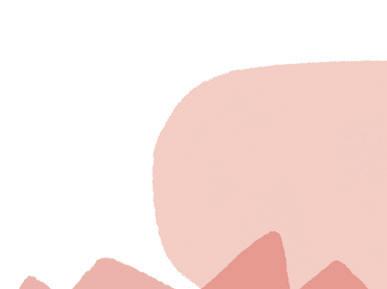
No biggie but i have to tell you something... if my uncle dies my brother will be a lord.



That's what I want from a vape, that it's so strong it makes me reevaluate if I want this with my life and everytime I think yes.





At my primary school there were 30 people in our class and 15 of them owned farms


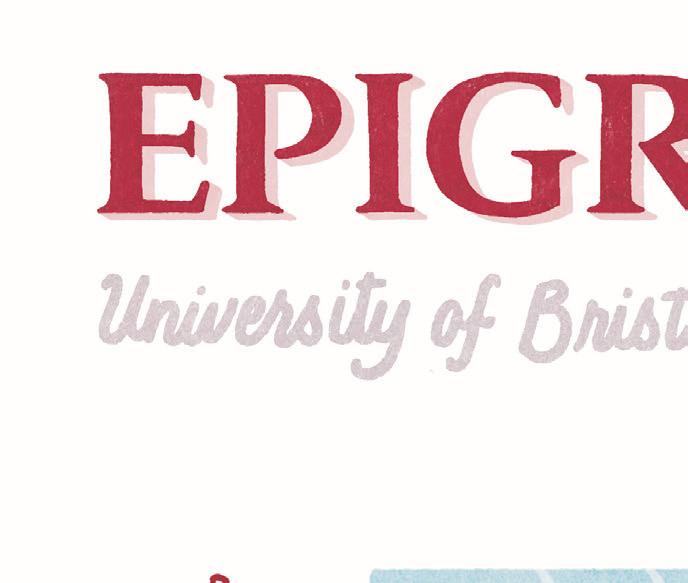
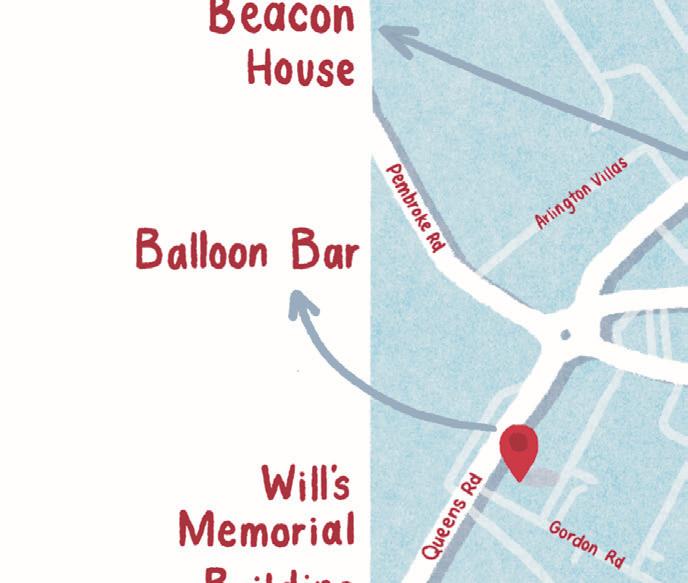
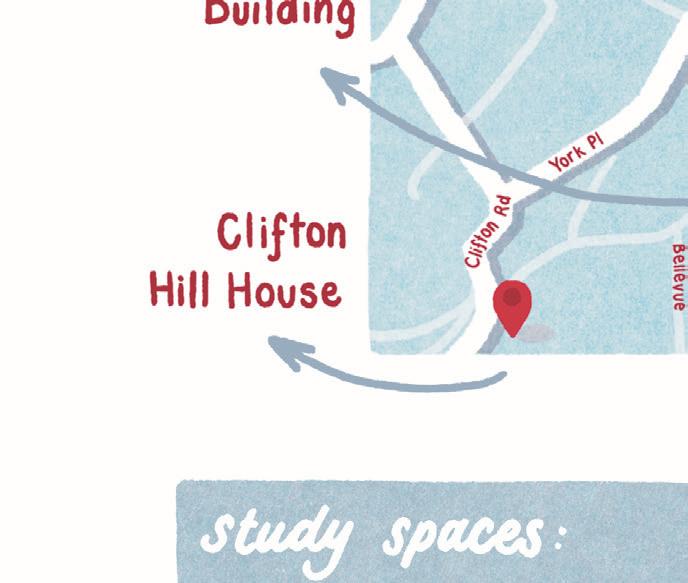
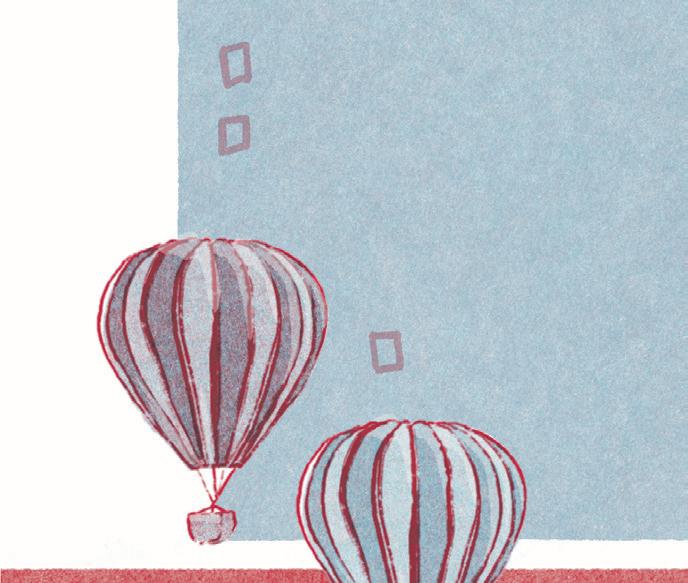

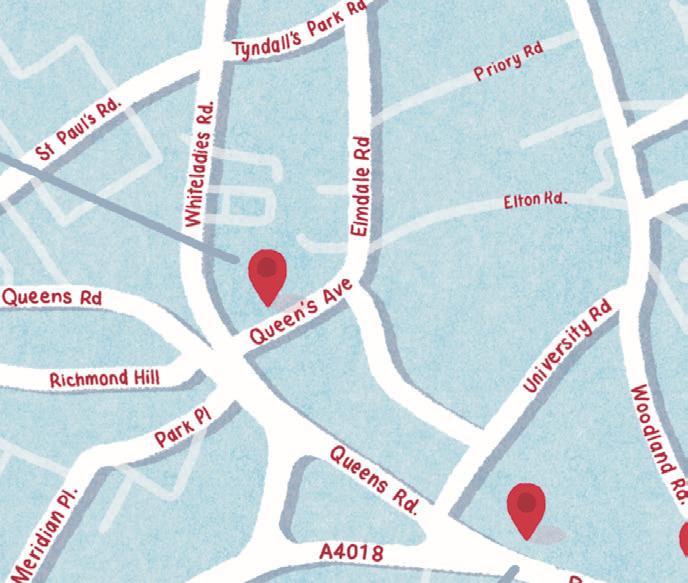
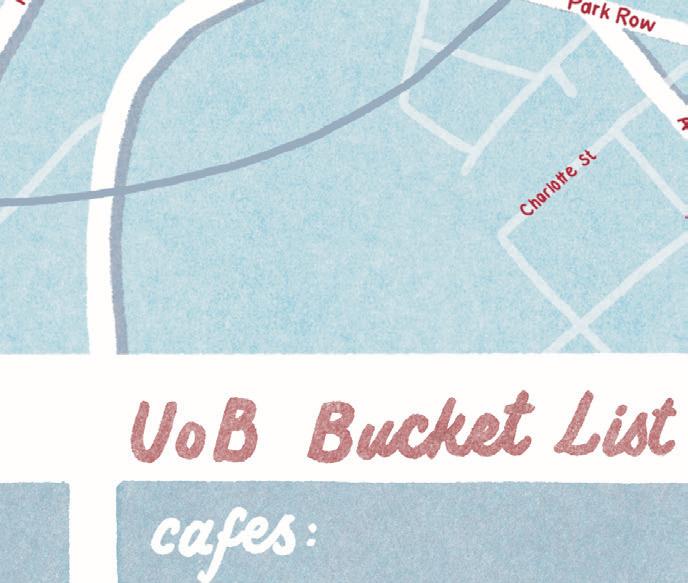


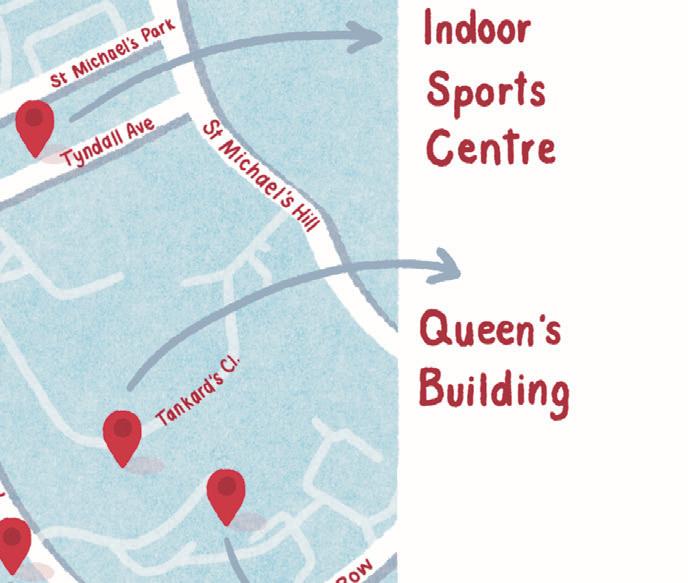
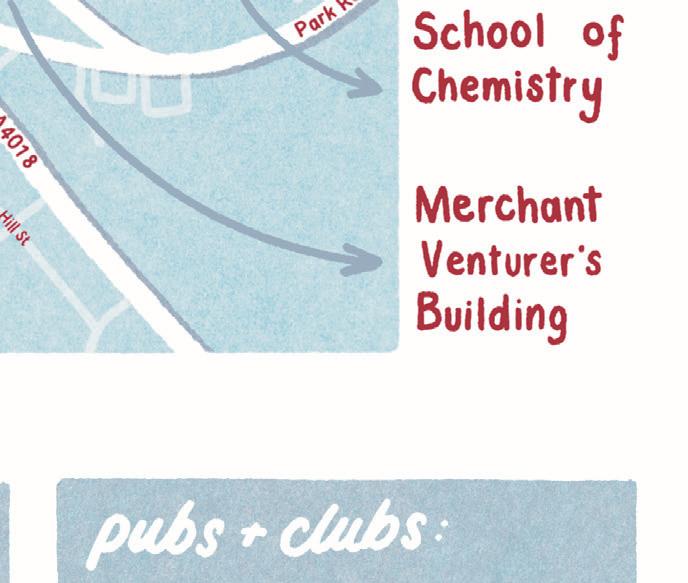






We think you should join Epigram because...

- Fortnightly socials
- Journalistic events from the FT and The Times

- Upskilling sessions to support your journey into journalism
- Oppurtunities to write for Epigram and the Croft to see your work in print
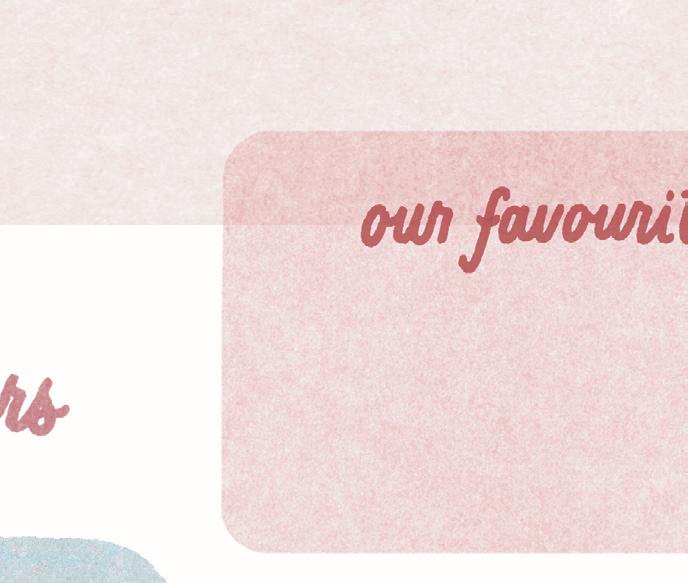
Societies can be scary but are worth it to meet new people and try new things. You might end up lowing them
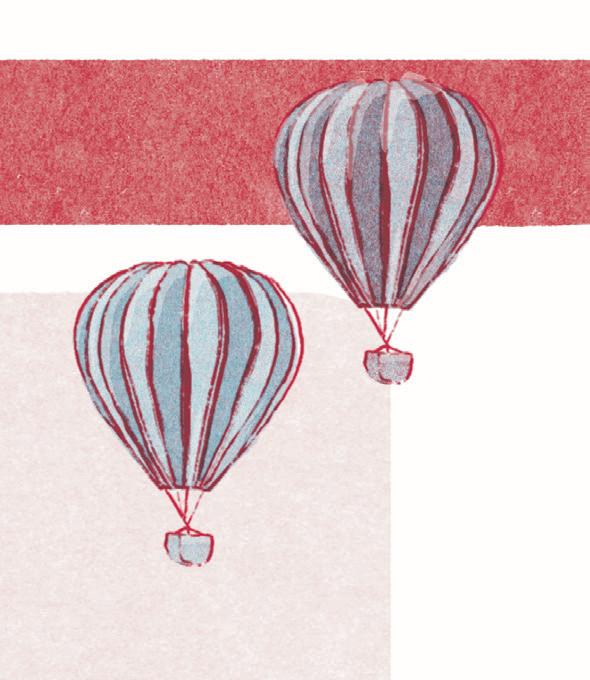
1. Bristol SU Website (to join societies and freshers events)
2. Bristol Mental Health and Wellbeing services
3. Headspace, meditation and mindfulness app (85% student discount)
4. Mind, Student Mental Health Services
Go out as much as you can! (refer to ‘A Guide to Thriving and Surviving in Halls’) It’s completely normal to feel homesick! This feeling will pass, and trust me, this is a new experience for everyone
Form a good relationship with your first year flatmates (refer to ‘A Guide to Thriving and Surviving



Use your weekends as an opportunity to windown from the week. Go on walks, find green spaces, fill your cup with activities to better your mental health in the long run
Spend time researching cheap and healthy recipes!
Don’t panic if you don’t get on with your flatmates, you’ll find your people
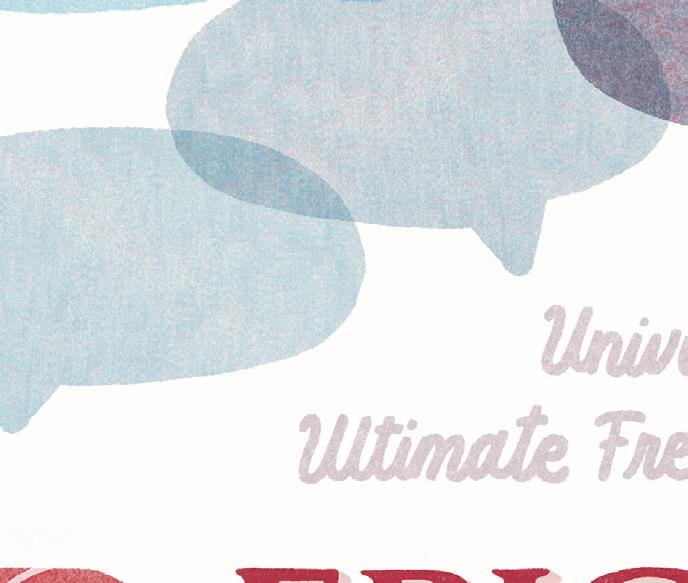
Make sure you note down and understand the layout and format of your first year assessments - this could include weighting, number of assessments, etc.



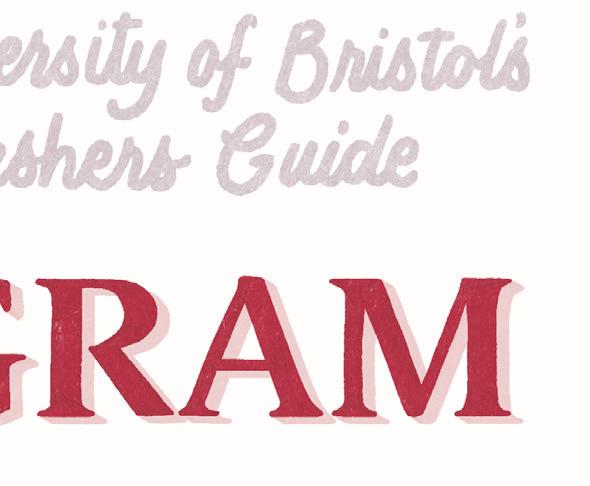
Editor Co-Deputy Editors Sub Editors
Bruno Bridger
Elizabeth Abbott & Ella Heathcote
Bobbi Carsley & Eve Davies
The Art of brat- How design has proved itself fundamental to the conversation of youth, gender and politics
Ella Heathcote examines the design process behind the style of the summer.
Ella Heathcote Arts Co-Deputy Editor
Brat is the sensation of the summer, and its cover is a disaster. Charli XCX’s sixth studio album embodies a messy, club-going, un-selfconscious lifestyle; a welcome return for the ‘recession pop’ of the late 2000s and early 2010s, headed by artists like Kesha, Rihanna and Lady Gaga. Charli defined the character of 'brat' as being "trashy": "just like a pack of cigs and a Bic lighter and like, a strappy white top with no bra.” Brat welcomes the long-awaited rival to the ‘clean girl’ aesthetic that has dominated social media for the past few years. It is a rejection of the ceaselessly image-obsessed society which shackles us and forces us into narrow definitions of how we must present ourselves. And yet the iron fist of aesthetic reigns supreme. It was never going to be long before brat marketing surfaced, and TikToks of ‘brat outfits' and makeup tutorials started rearing their heads. The album cover (see right) is central to the buzz surrounding brat. The cover’s pixelated, stretched arial font evokes MySpace and LiveJournal user icons, a symptom of the current yearning for the early digital age. We’ve seen this desire in the re-release of the Nokia 3310 (originally released in 1999) and the glamorisation of Y2K aesthetics online. The placement and size of the text is deliberately jarring and unappealing, and the cover’s distinctive slime green background was equally thought-out.

revealed that the design process involved choosing between 500 shades of green, before landing on the most off-putting one, described by Charli as 'quite disgusting'.
'Brat is a rejection of the ceaselessly imageobsessed society which shackles us and forces us into narrow definitions of how we
Brent David Freaney, designer of the album cover,
The singer claimed that the aim of the cover was to start conversations about desirability. In this way, the cover mimics the album’s subversion of feminine ideals and refusal to bend to the entrenched standards for women.
So the impact of colour rages on. Historically, colours in art took on significance based
on how hard they were to source - purple for example came to represent royalty as a result of the expensive process of making the Tyrian dye - and to this day , new colours are discovered and come to bear associations with class, political alignment, emotions and character. As quickly as they are discovered, colours become owned. In the 1960s, Yves Klein bought the rights to his signature ultramarine blue. In 2016, contemporary artist Anish Kapoor famously bought Vantablack, at the time a new paint known as the
‘blackest black’, a shade which absorbed 99.956% of light, giving everything it touched a deceptive flatness.
'The cover design process involved choosing between 500 shades of green, before landing on the most offputting one, described
In trademarking Vantablack, Kapoor legally banned anyone else from using it which provoked artist Stuart Semple to retaliate by creating his own colour that he branded as the 'pinkest pink'. He then put it on the market for everyone but Anish Kapoor, making consumers of the paint sign a document stating that they are not Kapoor, or purchasing on his behalf. 'Brat green' has its own monopoly over the summer, much how Barbie pink reigned over the last.
Epigram's Arts team recommends a few must-visit venues for those new to the city of Bristol.
Bruno Bridger and Bobbi Carsley Arts Editor and Arts Sub-Editor
Donald Rodney's 'Visceral Canker' @ Spike Island Spike Islands' newest major exhibition, a retrospective of the work of the late artist Donald Rodney, includes works that span from his early sketchbooks to final masterworks, and
reveal a deep interrogation of the predominant themes that pervade his work, illness, disability and race. Standout pieces such as Rodney’s lightbox work John Barnes (1991) (pictured), a lit presentation of the infamous image of footballer John Barnes reacting to racist abuse from opposition fans, as well as one of his most notable installation works Doublethink (1992), reveal a body of work in conversation with the legacy of the African diaspora and its continued struggle against prejudice and outdated public and media perceptions. Alongside these works, Rodney’s piece
AUTOICON, an early piece of internet art, provides a view into where Rodney seemed to be taking his career later in life. A pioneering interest in cybernetics and installation is on display, whereby those visiting the gallery are encouraged to interact with a computer programmed by Rodney himself. Visceral Canker is a career retrospective that cannot and should not be missed by students in Bristol. It reveals an artist far ahead of their time, whose career and life was tragically cut far too short.
Centrespace
Centrespace’s characteristic location is part of why I love it. Walking down the graffiti flanked alley just off St Nicks, your artistic experience begins the moment you step off the main street. Exhibitions in Centrespace frequently change so your attention is repeatedly being reclaimed and makes the gallery flexible to cater itself to everyone’s different interests. Open studio events are another special event to keep an eye out for. I defnitely recommend everyone to take the time to discover it for yourself.
Cafe Kino
Cafe Kino encompasses much more than a cafe. It more aptly captures as a common gathering point for forms of self-expression. While enjoying a cheeky chai latte the cafe also plays host to events that are frequently at the epicentre of Bristol’s cultural scene - a top pick being Kino’s queer life drawing sessions. It’s a place where LGBTQIA+ individuals can have a chance to breathe in a safe environment and try new artistic modes.
Elizabeth Abbot visits The Arnolfini, one of Bristol's most renowned galleries, 60 years on from its opening as a small gallery on the Triangle.
Elizabeth Abbott Third Year, History and
In 1961, The Arnolfini had just opened as a small gallery above a Bookshop in the Clifton Triangle. Now, just over 60 years later, the gallery holds pride of place on the harbourside, located in a Grade 11 listed property which welcomes hundreds
of thousands of visitors each year. The space champions various art forms; from visual art to film, to music and dance.
Founder Jeremy Rees named the gallery after his favourite painting, The Arnolfini Portrait. He wanted the gallery to challenge visitors perceptions and for them to above all, ‘enjoy’ themselves.’ Presently, the downstairs studio hosts Nengi Omuku’s exhibition The Dance of People and the Natural World. Inspired by her herbalist mother, Omuku's work nodds to the healing power of the natural world, combining
humans and nature in her art to demonstrate the potential for harmony and peace when both are united.
Time and time again, colour proves its authority outside of the artistic sphere. Naturally it hasn't taken long for brands to start catching on. Clothing and makeup companies are promoting products in 'Brat green' , while Vogue Buisness reported that searches for items in the 'brat-style' slime green increased by 17 percent in just two weeks. It seems our world has a way of ingesting every attempt at liberation from a system and regurgitating it for mass consumption, but perhaps we can see through that. At its core brat is about an attitude, so in order to truly embrace it we must drop our pretences, stop buying, and enjoy our youth.

Okumu’s art depicts personal locations like her garden in Lagos, Nigeria, alongside imagined places, and those far away like Monet’s Garden. She plays with dreamy colour palettes and incorporates soft human figures to depict ‘psychological spaces’ that move beyond traditions of colonised landscapes where terrain was taken and controlled. Instead, she presents a mutual relationship between man and his surroundings, with the marvellous tones of blue, pink and green suggesting wonder and awe from both sides.
Omuku paints on Sanyan, a pre-colonial Nigerian textile woven from moth silk and cotton, celebrating Nigeria’s tradition of craftsmanship.
The cloths are hung from the ceiling to allow visitors to walk behind the painted sides revealing the unstitched halves. This connects Omuku’s act of painting with the creation of the cloth she painted on, allowing her to play with temporality and the notion of creative connectedness.
It is a truly beautiful, meditative, colourful exhibition reminding visitors of the bond between our human souls and the heart of the earth.
The floor upstairs is home to Adébayo Bolaji’s exhibition In Praise of Beauty.
The chain of rooms trans-
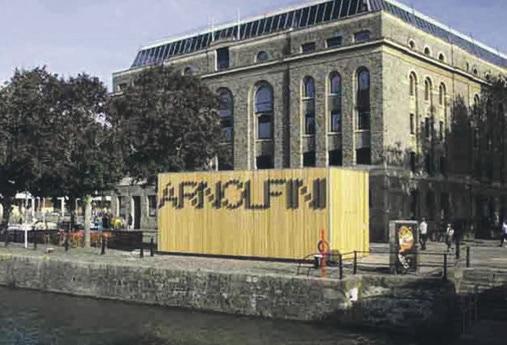
ports visitors inside the brain of Bolaji as he ponders society’s perceptions of beauty. The walls of the rooms are covered with sketching from his notebook as he asks, ‘Does art need beauty?’ and ‘Where do we find beauty, inside or outside ourselves?’
With some of his thoughts appearing more assertive such as: ‘I said beautiful…not perfect.’ The walls have cut-outs with small screens showing a film of him discussing such thoughts.
We see less-literal reflections on beauty too. Bolaji presents a photograph of himself, with painted blue lips, glasses with pearl edges, painted nails, and a long black coat and beanie perhaps nodding to masculine beauty in unconventional terms. We see acrylic and oil paintings like The Vessel (2024), drawings, and a mythological-inspired sculpture The Head of Medusa (2024). There is also a film titled I Love You (2024) which plays on a loop upstairs. Alongside the exhibitions, The Arnolfini has rooms on the top floor dedicated to visitors exploring their own creativity. There is an art room and a reading nook, with books, art materials, and even yoga mats provided. Downstairs, there is a delightful bookshop full of fun and eccentric books. Next to this, there is a café for you to think about the gorgeous art you have seen over a cup of tea. The Arnolfini's latest exhibitions, The Dance of People and the Natural World and In Praise of Beauty are running until 29th September.
Editor
Max Bradley-Cole
Co-Deputy Editor
Meadow Wattret
Co-Deputy Editor
Chien Wen Siow
Subeditor
Nadiya Jackson
Subeditor
Marianne Chatburn
Four banging societies that cater to every last wish and whim of Bristol Uni’s bustling film community.
Max
Bradley-Cole Film & TV Editor
The University of Bristol is a goldmine for students who are passionate about Film and TV. Whether you are dreaming of becoming the next Scorsese, fancy yourself a budding critic or simply want to sit back and watch a movie with your mates, Bristol’s film societies have got you covered. So, here is a short rundown of the top societies you must check out if you are even slightly interested in the silver screen or want to become the biggest film BNOC.

Have you ever watched a film and thought, “Psht, I could literally do that”? Well, look no further than InFilm for your chance to show off your filmmaking chops. InFilm is UoB’s only filmmaking society. It does matter whether
you are already a master at cinematography or you still think a “boom” is what happens when you drop a microphone, InFilm welcomes anyone regardless of their skill level and hopes to teach you new skills or reinforce the ones you already have.
InFilm runs on a bi-weekly schedule that alternates between workshops and socials. Their workshops are designed to show you the ropes of filmmaking, from scriptwriting, to camerawork, to editing. They have also had workshops run by industry professionals, ooh fancy! These can teach you some extremely valuable lessons for breaking into the industry and what to expect. But all work and no play makes InFilm a dull society, so InFilm also host a variety of socials, from pub crawls (wehey!) to movie nights, giving you the chance to fob off your course and hangout with the coolest people at UoB. (Not that InFilm or Epigram recommends fobbing off your course.)
If you have a dream project in mind and need some extra hands to actualise it, they will post your project, listing the roles needed and help you find others who are eager to join. Or, if you are looking for experience and have no idea where to start, you can post yourself and your skills and watch all the desperate film students snap you up. And, who knows you could become the next Spielberg.
How to find yourself and what happens if you deny your true self.
Maisie MacDonald
3rd Year, Geography
I Saw The TV Glow is Jane Schoenbrun’s coming of age
film following the ever-distant Owen (Justice Smith, Ian Foreman) through three stages of life. The scared and shy Owen perpetually appears to be struggling

Watch out Alison Hammond, because the UK’s next national treasure is just around the corner. UBTV is UoB’s very own student-run online television station, and they are always looking for fresh talent. Whether you want to be in front of the camera and the star of the show, or behind the camera and making sure the presenter looks presentable, UBTV has got something for you.
Open to all degrees and all year groups, UBTV requires no prior experience and provides you with plenty of training from interview technique, to writing, to research, and editing. UBTV also know how to have a good time with a variety of socials and fortnightly meetings, where you are welcome to pitch your own ideas and get involved in as many projects as you can. They have three departments, News, Culture, and Entertainment & Nightlife (wehey!). So, plenty to sink your teeth into.
And if you are wondering just how employable UBTV can make you, you need look
no further than UBTV alumni
Lindsey Russell, who went on to become the newest Blue Peter presenter. You’ll learn many valuable skills that will help you in any career, especially media and you will also have a cracking time doing it!

BCA
No, BCA is not an AA adjacent society for those addicted to Bristol Cinema, it stands for Bristol Collaborative Arts.
For those who like their Film with a side of Music and Theatre, BCA is where all the cool nerds go to realise their artistic dreams. BCA is a unique interdisciplinary society that aims to collaborate (surprise) and create art aimed at bringing together students from the best creative disciplines, Film, Music, and Theatre.
Most importantly BCA is about getting your work SEEN. Throughout the year they post your work on their ever growing social media pages. They also host dedicated feedback sessions as well as pitching sessions where you can pitch your projects to the society. The best ideas receive funding
and the chance to be showcased at BCA’s annual exhibition, where everyone can see your genius unfold and when you win that Oscar, they can brag and say they knew you at university.
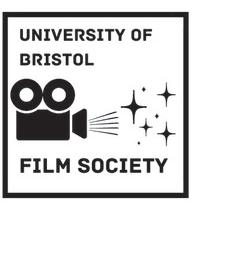
If your definitely cool like me, because cool people say they’re cool all the time, your idea of a perfect night involves grabbing as many sweets in Lidl as you can and watching a great film. If so, then UoB’s Film Society is calling your name. This is the first and only stop necessary for Bristol cinephiles, whether you are looking to expand your filmic taste with an artsy-fartsy arthouse cinematic masterpiece, or dazzle your brain with a pew, bang, boom blockbuster, or anything in between, Film Soc have got you covered. They host FREE weekly screenings that are open to all – no membership required! But I recommend joining (for a mere £3). you’ll get access to some extras like free entry to their amazing pub quizzes!
Here are some of the best upcoming films to see at the Watershed during Freshers!
Anna Luna Biddle 4th Year, Film and TV
When thinking of Freshers Week, the first thing that comes to mind is endless socialising, and for some, endless drinking. But to survive the chaos, we propose a calmer activity. One that can be carried out with friends, but also as me-time, when those first Stoke Bishop flat parties have drained your social battery. One that will cost you the price of two VKs (or of a vanilla oat iced-latte), but keep you entertained for hours. It is a suggestion that many Fresher's guides tend to leave out, an underrated lifesaver. The activity in question?
A trip to the cinema. And since it's Bristol we're talking about, the location is Watershed.
Watershed is an independent venue on the harbourside, with a cafe/bar and an exciting programme of independent films and festivals. Its cozy screens and spacious seating make you never want to enter a commercial/shopping centre cinema ever again, let alone its £5 anytime tickets available for students. A creative gem at the heart of the city, it was named the leading film culture and media centre in the South
West. Here are some of the upcoming films you can go see this September at the venue.
Sing Sing (2023)
For the A24 fiends starting university, this inspirational account of a prison theatre program has received stellar reviews. It tells the real-life story of how inmates of a New York penitentiary found their voices through an artistic rehabilitation project. And Sing Sing's director, Greg Kwedar, chose to do so with a magnificent cast of former prisoners, who experienced the program themselves. It is a statement on the transformative power of the arts, guaranteed to please any of us film/theatre geeks.
The Outrun (2024)
Based on Amy Liptrot's memoir, this drama stars Saoirse Ronan as 29-year-old Rona, who returns to her Scottish island hometown after rehab from alcoholism, in an attempt to come to terms with her past.
It is an introspective journey that leaps back and forth in time to cover the main character's descent into the mess of addiction. If there's one thing Saoirse Ronan does well, it is the conflicted female character coming of
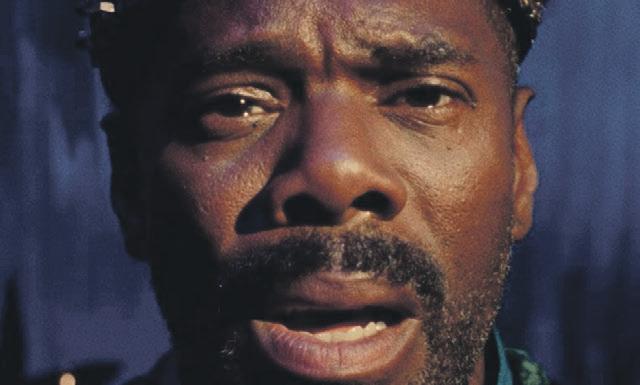

age, and her performance in The Outrun has praised by critics.
Starve Acre (2024)
In this folk horror, Matt Smith plays an archaeologist who moves back to his rural England hometown with his family. What follows is an interaction between his memories and the occult, leading to a descent into supernatural darkness. You know you are in good hands with the same executive producers of The Zone of Interest (2023) and MaXXXine (2024). The trailer is chill-
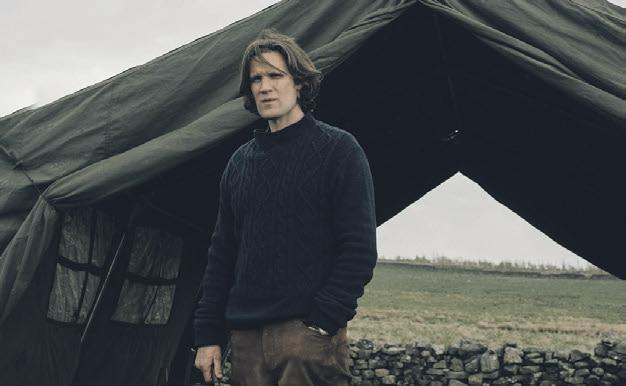
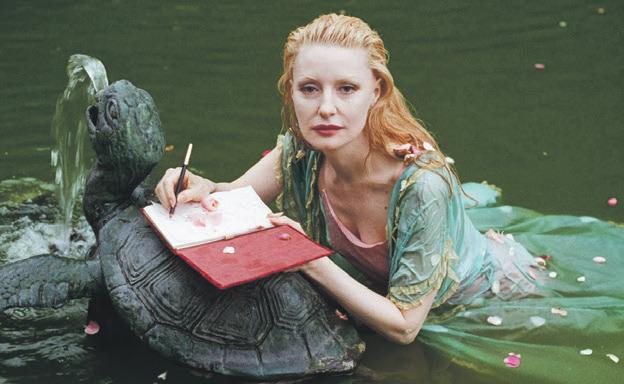
ing, its enough to make you as uncomfortable as a good psychological thriller should.
The Disappearance of Shere Hite (2023)
If you're looking for something more educational, then this documentary about American feminist icon Shere Hite should be on your firstterm bucket list. In 1976, Hite published the 'Hite Report', which challenged the commonplace perceptions of female sexuality at the time. After years of hostile reception and personal attacks
from male public figures of the time, she was forced to escape to Europe.
This documentary does justice to her legacy, exploring her life and prominence, all through the voice of Dakota Johnson. Although it will not be playing at Watershed in September, it has been confirmed for some time in the remaining months of 2024, so keep an eye out and don't forget to check out our review on here if in doubt!
with his family and social life. However, through forming a friendship with fellow weird kid Maddy (Brigette Lundy-Paine), he develops a fascination with The Pink Opaque, a TV show reminiscent of Buffy The Vampire Slayer. The big bad of The Pink Opaque is the aptly named Mr Melancholy. The pair become entangled with the show, where their lines between reality and fiction become increasinly blurred. Maddy and Owen are both outcasts and find solace in The
Pink Opaque. Consuming the show allows them to explore themselves and exist in a place and self other than being sad teens in suburbia. Through identifying with one of the characters Owen is able to explore himself and his identity. However, we see him at odds with the act of exploration.
This terrifying and dangerous choice of whether to escape the confines of one’s situation and run away to be their authentic selves presents itself. However, the safe and comfortable option to stay and conform to societal expectations is also explored and the consequences of this. What happens if you deny yourself?
The film’s repeated motifs and items lends it-
self to a rewatch to notice how The Pink Opaque may have been surrounding the protagonists throughout.
The bisexual palette is enough to make anyone jealous and offers feelings of nostalgia even if it is a tad predictable for a film of this genre and themes.
The cinematography is paired with stereotypical sad girl music from an impressive array of artists such as Phoebe Bridgers and Coraline Polacheck.
Go check out the full review on our website!
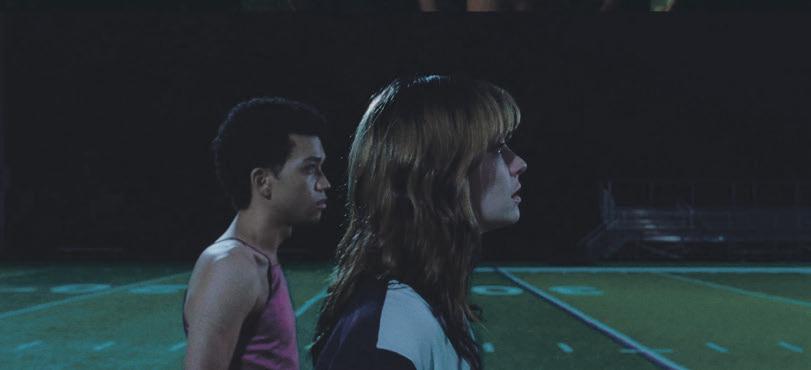
Bridgerton season three: Hard to love, even harder to hate
While I recognise its pitfalls, I think this season did exactly what I wanted it to do – it was 8 hours of carefully crafted televisual comfort food.
Marianne Chatburn Film & TV Subeditor
Based upon the bestselling book series by Julia Quinn, Netflix's romance drama explores how the members of the wealthy Bridgerton family manoeuvre their way between the upper echelons of regency era society while under the watchful eye of Lady Whistledown – Bridgerton’s very own Gossip Girl.
By now, viewers are well
aware that Penelope Featherington (Nicola Coughlan) is in possession of the infamous Whistledown alias, and with years of watching lovers from the sidelines, season three promised her a long-awaited romance with Colin Bridgerton (Luke Newton).
As each new season rolls around, Shonda Rhimes is faced with the colossal task of convincing her avid viewership that the newest romantic pairing is even more lovable, shiny, and exciting than the last. Following the immense success of season two’s Kate (Simone Ashley) and Anthony (Jonathan Bailey), it was
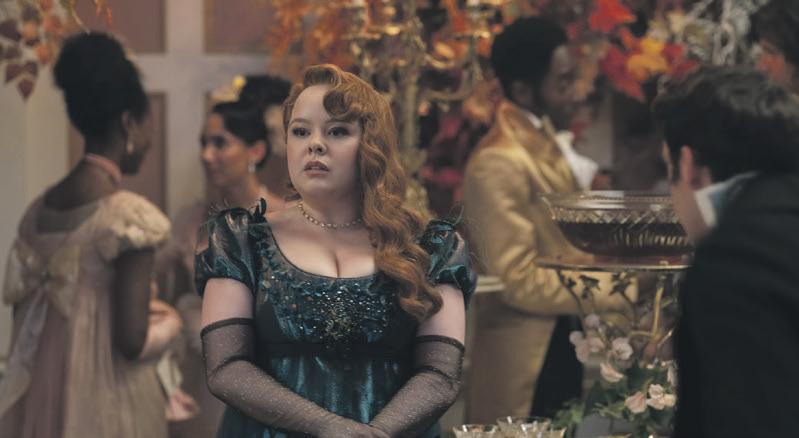
clear that season three’s Penelope and Colin had big, well-polished boots to fill.
Despite the element of lifelong friendship disturbing the usual romantic formula, Penelope’s decade of internalized affection for Colin seems to work to the writers’ advantage as we have spent the previous two seasons
waiting expectantly for their platonic relationship to unravel into something more.
This season commences with Colin returning from his grand tour around Europe where he seems to have found himself as well as a new barber.
Although I found the re-introduction of Colin’s newly weathered character some-
what clunky and implausible, Coughlan salvaged the storyline by presenting Penelope’s realistically conflicted reaction. It is comforting to know that our protagonist is just as frustrated as we are, upholding the fine-tuned everyman relatability that defines her alternate identity. Coughlan and Newton’s on-screen chemistry also consistently elevates the script, as they work around the friendly dialogue that the characters share and add the subtle but crucial evidence of romantic yearningsomething that can only truly be captured by expression.
For the full review , please head to our website!
How many British musicians have been in not one, but two of nation’s most influential bands?
Benji Chapman Music Editor
Trigger Warning: This article contains mentions of suicide
How many British musicians have been in not one, but two of nation’s most influential bands – each in a completely different genre? Starting out in Joy Division, Peter Hook began his musical career as the group’s bassist; a twenty-year-old punk rocker who didn’t know his amps from his speakers, or bass from electric guitar. With the tragic and premature passing of Ian Curtis he went on to found New Order, fronting the spearhead for a more danceable and electronic period of British music. We sat down to talk Joy Division, Mancunian Uber drivers, and New Order’s longstanding beef with nightclub management. Peter Hook is just as protective about his Uber rating when ordering a taxi in Manchester as I am. ‘You should do what I do. Don’t use them and stay at 4.7.’ Hook, or Hooky, may now be residing in Mallorca between tours with his new band, The Light, but as I was quick to discover, he is still as grounded by his Mancunian roots as he was when Joy Division began in the city in 1976. Manchester has both given to and taken from the bassist; one of the few constant backdrops in his impressively diverse musical career. After his time in Joy Division, he co-founded the city’s Haçienda nightclub alongside New Order and Factory Records in 1980, before witnessing its unfortunate closure seventeen years down the tracks: ‘The architect was given a blank cheque to create whatever he wanted, and we didn’t know.’ ‘The next thing we knew we were 750 thousand quid down, with this huge, over-designed club that basically nobody wanted to come to for a long time.’ The so-called ‘blank cheque’ also set a precedent for some interesting bar selections; the only beer available was Rob
Editor
Benji Chapman
Co-Deputy Editor
Aditi Hrisheekesh
Co-Deputy Editor
Megan Foulk
Subeditor
Amelie Peters
Subeditor
Sophie Scannell

The task of a fresher to find their way around Bristol musically is not always an easy task.
the city for lovers of different types of music. Located on St Nicholas Street, Mother’s Ruin is a haven for rock lovers.
‘The next thing we knew, we were 750 thousand quid down, with this huge overdesigned club that basically nobody wanted to go to'
Gretton's personal favourite, Red Stripe, before he switched to his new preferred drink of choice, the costly Sapporo lager upon its discovery in Japan. ‘How bonkers is that!’ Hook chuckles. As the onus of responsibility to finance, produce, and promote a band falls more and more on the members themselves, Hook comments that ‘IDLES will not be able to open a club - I can guarantee you - or be able to entertain a city for seventeen years the way New Order did, with cheap drinks.’ Upon his second dry cackle, there’s a distant twinkle in his eye that’s sparkling with recollected fondness; memories of what I imagine were some duly hedonistic nights that trickled into the early morning, during the glory days of the ‘Madchester’ scene. Indeed, Peter Hook has inadvertently become somewhat of a chronicler for the UK’s ever-changing music scene, witnessing and personally participating with its transition from punk rock to dance music. As he shares however, his seminal role in the ‘90s dance scene begins in a deceptively unassuming fashion inside a music shop, with a twenty-year-old Peter Hook learning what a bass guitar was for the first time.
‘That’s only got four strings, my mate’s has got six strings!’ Hooky recalls telling the shop’s owner, who replied bluntly, ‘that’s cos your mate’s is a guitar, knobhead.
This is a bass.’ Forced to use only a shoddy £10 speaker that he purchased after mistakenly buying an amplifier with no speaker cab, he learnt to play unconventionally high-pitched melodies up the top end of the neck since it couldn’t articulate conventionally lower bass frequencies. ‘It sounded like ten quid’, he grimaces in recollection.
‘We were your age (20) when we made that record (Unkown Pleasures), and I don’t know about you, but we didn’t know our arse from our elbow.’
‘We were your age (20) when we made that record (Unkown Pleasures), and I don’t know about you, but we didn’t know our arse from our elbow.’ As I jokingly look to check where my elbow is resting, there’s a mutual understanding in the call that the age is not necessarily one when you write the one of the most seminal postpunk records of all time. But the fantastical irony of the band’s success was their unknowingness of this fact.
‘We were writing music that we couldn’t tell how good it was... We wanted Unknown Pleasures to sound like the Sex Pistols,’ Nevermind the Bollocks: big guitar, rip your head off. Total punk. We wanted a punk LP.’ ‘Martin Hannett realised that our songwriting had far outstripped our mental capacity’, Hooky laughs, between sips of an Arizona Iced Tea. ‘That’s how daft we were. We were just kids messing about… and I must admit, when he gave us Unknown Pleasures, we were going “what the f*ck is
this? This doesn’t sound like the Sex Pistols?”’ The tradeoff for the initially disgruntled band was that they could revisit their more angsty sound live, while lead producer Martin Hannett sealed the slower and more ambient aspects onto the studio album: ‘Live we were a lot different, we were very aggressive. We got the best of both worlds. He gave us a great record that had the wonderful gift of timelessness: the reason you’re listening to it years later is because of Martin Hannett’s production.’
‘If me and Barney were let loose, I probably wouldn’t be sat here talking to you’, Hooky says while shrugging.
Channelling the young members’ slightly impatient vivacity was supposedly no easy feat for Hannett, and Hooky imitates his 20-year-old self reaching sporadically into the air, rattling his laptop's camera on the desk of his sun-lit flat. ‘In those days, you had to seize the moment – you were a kid. What do people say to you nowadays? “Don’t rush, take your time” and you go: “no! no! I want it now!”’
And as Hooky shares, the feeling of an adolescent Joy Division being unable to stop during its rise to popularity had devastating effects for its members. With the suicide of Ian Curtis in 1980, Hooky describes how ‘He was suffering from something that he needed to correct, but he didn’t understand it… He
didn’t want to lose the impetus, so he forced himself on as well as he could, and in the end, he decided that - for many reasons - he couldn’t carry on.’ After Isaac Wood’s departure from Black Country, New Road - another British post-punk outfit - in 2022 in order to address his mental health, I presented this to Hook as a point of reference for how the music industry, and society more broadly, has perhaps strengthened its education around mental health. ‘It’s better now, and I’m better educated. If I had had the education I’ve got now, then I wouldn’t have let him play.’ Hooky says in response. ‘I would have took him home and I would have sat on him until he got better.’ Recalling a gig in Bournemouth where he held Curtis’ tongue for over an hour during a seizure, the extent to which Curtis underemphasised his struggle could not have been made clearer by Hook. He explains how ‘We took him to the hospital, and he came out of the hospital and said “right are we going for a drink?” and we’re going “Ian, you’ve just been on the floor for an hour.” Could we stop him? No.’ It's touching how Hooky so vividly recalls his time in Joy Division, even amid the passing of Curtis, who was so central to the band: the first to instruct Hooky to play so high up the neck in Hooky’s now signature style – ‘really it was at his behest’ he says. ‘I still feel guilty about Ian now, the same way I feel about a lot of my friends who have passed away.'... Read more at Epigram.org.uk Yet, if the departure of Isaac Wood from his band has signalled anything, it’s that there is a newfound - and growing - awareness within the British musical community surrounding the extent of the pressure applied to musicians, and more than this, an acceptance that taking time off is ok. ‘We’re not afraid, I’m not afraid, to say “I can’t do that”’. Hooky tells me more directly, ‘You should always look after yourself, I’ve learnt, because the world keeps turning. You just get back on six months later.’... Read more at Epigram.org.uk
Aditih Hrisheekesh Music Co-Deputy Editor
It’s the first day of university, and you are sucked into a capsule of hedonistic technicolor that is Freshers Week. A fever dream of a week - the students are everywhere, figurines scattered across a Lego City. It all feels a bit unreal at first and it can be difficult to find your footing within the city. It’s Bristol, a city renowned for its buzzing nightlife and broad scope of music suited to various tastes. It is the home of trip-hop, birthing the likes of Massive Attack, Portishead, and Tricky, as well as being the thrumming heart of drum and bass. Graffiti-clad walls adorn Stokes Croft, historic King Street pubs sometimes feel like a 2000s time capsule. There is a pulse that thrums out of the city’s music, brimming with an avant-garde collision between tradition and modernity. But don’t fret; for here is a guide to nightlife through the student hub of
This dive bar, with its eclectic decor and walls adorned with rock memorabilia, offers two floors of hard-edged live music, hosting gigs on average three times a week. Themed club nights cater to fans of punk and new wave, and notable bands such as IDLES and Catfish and the Bottlemen have graced its stage. With its dark, grungy interiors and a cave-like basement, dive into this vessel of unfiltered rock.
For indie and alt-rock enthusiasts, Thekla is a must-visit on Thursdays. This unique venue, moored on a boat in East Mud Dock, spans two floors: shout your way through ’90s Britpop and other indie classics on the bottom deck – perfect for lovers of Blur, The Strokes, and Arctic Monkeys. Occasionally, the soundscape is graced with Radiohead (there is something surreal about clubbing to 'Just' or literally any Radiohead song – music I associate with solitude and being freshly fifteen).
Top deck, a more intimate space, caters to those who enjoy harder-edged emo and
alternative tunes, with hits from My Chemical Romance, Panic! At the Disco, and Pierce the Veil puncturing the air (again, these tunes are a nice salute to my fifteenyear-old self). Don’t miss the 2-for-1 drink deals, making it the prime spot for a memorable night out for students.
For those who crave live music with a time-travelling twist, The Fleece is your go-to. This venue regularly hosts tribute bands, paying homage to legendary groups like The Doors and The Stone Roses. It is also a hotspot for alternative and indie nights – whether you’re reliving the classics or discovering them for the first time, The Fleece is a musical time machine, pumped with nostalgia.
Nestled on a bustling street at the heart of the city, this intimate dance venue boasting live music on Tuesdays is a must for students. Featuring live jazz that reinterprets modern hits, layering them with a fresh, improvisational energy that makes you hear old favourites in a new light; the sound is rich and full in a room of shadowy purple light with rainbow fairy lights. Harbouring a
colourful beer garden, an almost bohemian atmosphere is created – a beehive of dancers. At the heart of Bristol’s rave scene, Lakota is the legendary stronghold of underground music, looming on the edge of Stokes Croft like a colourful relic. From the outside, it’s unassuming, almost secretive with a brick façade. Inside, it is a labyrinth of low ceilings and fluorescent lights. The DJ booths are gritty sanctuaries of sound, with music that is relentless - drum and bass, techno, jungle - pounding through the speakers like a heartbeat, primal and raw. It’s the kind of sound that gets under your skin, reverberating through your body, urging you to move even if you didn’t plan on dancing. A night out so quintessentially Bristol, it is a rite of passage for Freshers. A restaurant that turns into a bar, head to The Canteen for a laid-back vibe, the venue offering a mix of live jazz and salsa nights. With red decor and chill music, it is a great place to unwind after a lovely meal there during the day. If reggae is your jam, then Cosies in St Paul’s is where you need to be. This intimate basement bar is renowned for reggae Sundays, with thick bass and laid-back grooves piercing the air of the underground venue. Dim lighting and vintage decor exude a timeworn feel and, as per the name, a cosy charm. For folk lovers, The Eldon House is a hidden gem in Clifton, radiating an old-world charm that meshes with its modern comforts, perfect for those who prefer a night out with a pint and mellow folk tunes. Sometimes, one yearns for cheesy pop hits of the 2010s on a night out. Step into the cartoonish realm of La Rocca, where whimsical neon-tinted nostalgia spins across a kitchen-style dance floor. Let loose on a Friday night and sing along to the soundtrack of your youth wherever you decide to go for your first musical experience in Bristol, there's not a dud among them, and the sheer variety of venues on offer proves that there truly is something for everyone. Whether it's drum and bass into the early hours, or a coffee with some live improv; Bristol has you covered.
Are you a fresher? Have you ever been passed the aux at a Bristol University house party before? ... No? Lucky you. You'll need this article to survive.
Will Buckley Second Year Politics and International Relations
If your Freshers Week goes anything like mine, you’ll move to Bristol from a small town and instantly be overwhelmed by the city’s intense music culture. Your flatmate will claim his mate’s mate has a Boiler Room set coming up (he doesn’t). You’ll meet people who claim they’ve seen secret pop-up Massive Attack shows (they haven’t). Simply put, you’ll realise that you need to become a music snob, and quickly. This is where the University of Bristol Ultimate Freshers Playlist comes in. Throw this on at pres or afters and you’ll be convincing people in smoking areas that you’re a local scene insider in no time.

Credit:Virgin Records
Unfinished Sympathy by Massive Attack
It was always going to start here. Massive Attack are indispensable Bristol music, the band that typified and furthered the city’s image as a cultural hub. 'Unfinished Sympathy' has the perfect balance between chill instrumentals and a solid, pulsing beat which makes it perfect to play at any point in the night. And – it’s not as obvious a pick as 'Teardrop', so your music snob cred is safe here.
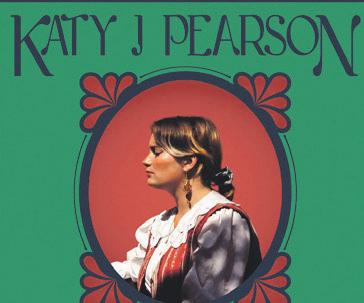
Recordings Beautiful Soul by Katy J Pearson
Country indie breakout Pearson’s 'Beautiful Soul' is in many ways the perfect song for Freshers Week. The week is all about meeting as many people as possible, and after saying ‘oh, wow, biomed? Too hard for me haha’ three hundred times in one evening, this burst of positivity will be needed. Also, the coda of 'Cause you’re a beautiful soul / You’re the beautiful soul’, closely resembles the drunk conversations you’ll have with the strangers in smoking areas you’ll bond with and then never see again.

Credit:Parlophone Records
You're Not The Only One I Know by The Sundays
Though they’re more tenuously Bristol-based than other acts mentioned, The Sundays’ status as alumni, in my view, wholly qualifies them to be on our playlist. Unlike other songs, this one (or any of The Sundays’ work) isn’t exactly a party banger, so don’t play it before heading to SWX. Best enjoyed on the way to the library.

Credit: London Records Inner City Life by Goldie As Amol Rajan says: 'we need Jungle, I’m afraid.' Another entry in the canon of Bristol songs you just can’t not know. Bonus points if you play this in your headphones while you walk past Turbo Island and knowingly smile at the people there like a fellow traveller, even though you were born and raised in Guildford. These picks give you a very basic introduction to the Bristol music scene, and help you survive being indie-checked by a bitter Carhartt-covered third year. Enjoy Freshers Week, and welcome to Bristol!
Editor Deputy Editor Corin Hadley Miles Gilroy
Perhaps 'having chemistry' is more than just a turn of phrase.
Corin Hadley Second Year, Chemistry
Another night, another group of strangers. The smells, the lights, the voices - your overstimulated senses. Perhaps, in a sweaty club, you pass someone you can’t help but look back at. Under the Sauvage and Alien, are there other chemicals in the air responsible for your fluster?
Pheromones are excreted in bodily fluids such as sweat,
saliva, urine and genital discharge. And yet, when we smell the sweat of someone we fancy, it’s not so offensive. Perhaps our tolerance of these usually repulsive fluids in those we are attracted to is down to how agreeable the right pheromones can be.
Pheromones are responsible for a whole world of chemical communication that is mostly beyond our sensory abilities. This ability to share information within a species helps organisms
survive and reproduce. They are often described as ‘sexy chemicals’, but have also been shown to play a major role in communicating danger and identity in the animal worldthink mice playing dead in the face of danger, or dogs marking their territory.
'Pheromones are excreated in bodily fluids such as sweat, saliva, urine and genital discharge.'
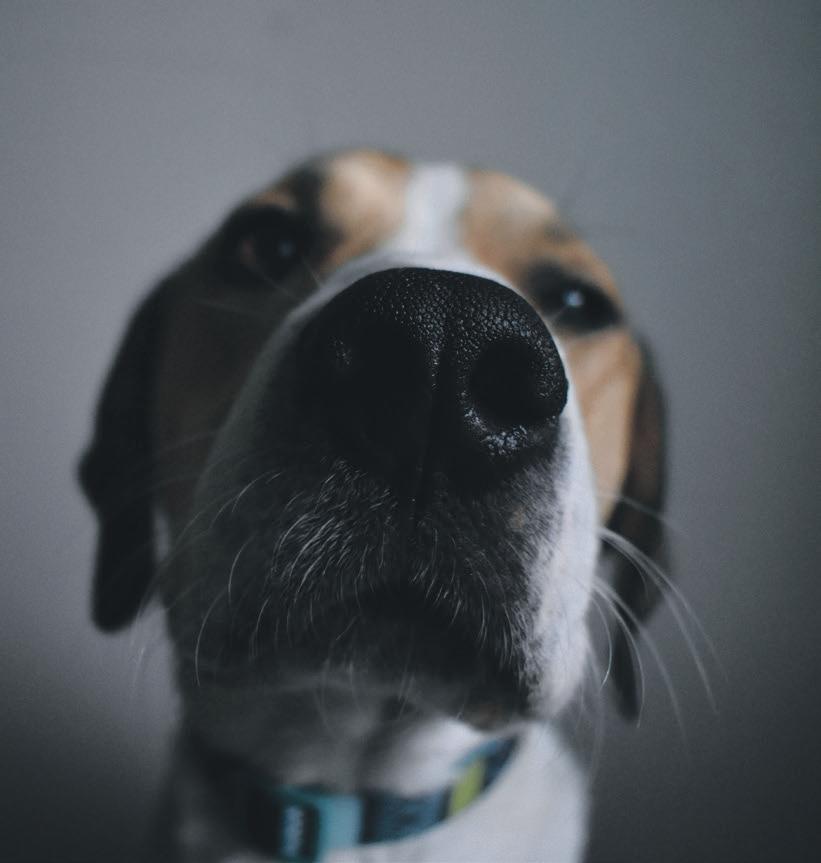
We know that in many organisms, pheromones are indicators of health and lifestyle. When dogs sniff each other’s arses upon meeting, they are actually exchanging a complex cocktail of chemicals in which information about identity, health, diet and even behavioural tendencies in encoded. Animals are also known to use pheromones as a way of expressing the contents of their genetic code, often in order to find the most biologically compatible mate.
In humans, with language skills that let us communicate complex ideas, pheromones are mostly redundant. And yet, there are some important things that nature has decided are still best smelt, not heard.
Despite not much being known about what exactly pheromones are telling us about each other, we know that they are an important part of attraction and recognition. One well documented function of human pheromones is in telling newborns which nipple to suck on. A breastfeeding woman’s nipple produces a strong, unique chemical signature that ensures
Ever wondered how a hot sac of air gets these iconic flying machines off the ground?
James Lewis Second Year, English
Bristol’s Balloon Fiesta, which takes place every August, began all the way back in 1979. With visitor numbers reaching as many as 100,000 on each day of the fourday festival, Bristol is very proud of its association with this spectacular sight. But how exactly do hot air balloons work?
that even from birth a child knows where its safe place is.
Even if we don’t know what we’re smelling, perhaps these kinds of chemicals are subconsciously noticed to help steer us towards a partner. It was shown by a team of researchers at Université Paris Diderot that people prefer the smell of those whose genetic immunity differs most from their own. Offspring from such partners would have resistance to a wider range of diseases, and would therfore be healthier. It has also been shown that humans are able to identify partners with who they are likely to have more reproductive success based solely on smell.
The perfume industry has tried to capitalise on this idea, and despite their deeply personal and specific nature, ‘pheromones’ have found their way into many consumer goods. Some of the most famous notes in perfumes like Sauvage and Alien (ambergris, musk, lavender, civet) are in fact plant and animal pheromones, which have been chosen because they are similar to human bodily smells. But though these perfumes smell great, to call them ‘pheromones’ in a product for humans would be to ignore the deeply personal and specific nature of these chemicals. However you might try to bottle up and sell sex and attraction, there will always
1.
The very simple answer –hot air rises. There are typically two canisters of liquid propane that sit in the gondola of the hot air balloon, which are attached to their own burner. It’s essentially the same fuel that powers your barbecue. Pretty high tech right?
One burner vaporises the propane before ignition: this uses the fuel most efficiently and is the one used for launch. The other burner known as the liquid burner, burns the propane while it remains – you guessed it – in liquid form. When flying over residential areas or close to livestock, this much quieter burner is used.
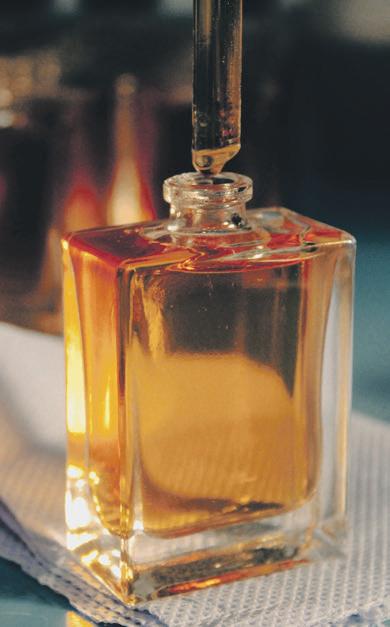
be a big element of it that is fundamentally individual.
'there are some important things that nature has decided are best smelt, not heard.'
Perhaps the limited research on the subject shows that even scientists, with their desire to dissect and explain everything, know they have no chance of understanding love. One thing science does highlight is how complex it is, and how many senses might be contributing to that feeling. The emergence of so much self-improvement, ‘jacked in thirty days’ content has pushed the idea of attractiveness as an absolute quantity, that can be bought or earned. Beyond the clothes, gym pass or beauty products you buy there are biological constants, personal to you, to which only certain people will ever respond.
2.
As energy is applied to the molecules inside the balloon, the molecules begin to move much faster, smashing violently into each other and the balloon itself. The space between each molecule increases, meaning the density of the air decreases.
In the same way that a ping pong ball floats in water, a balloon full of hot air lifts from the ground, because it’s less dense than the cooler air outside. The denser cold air is dragged by gravity underneath the balloon, pushing it up – this is known as buoyancy. It’s the same reason that your attic is hot, while the ground floor remains cool.
New chemistry continues to explain life, on our planet and beyond
Miles
Gilroy Second Year, Astrophysics
Two of the biggest questions faced by scientists at the moment are that of the advent of life on Earth and the possibility of life outside of Earth. Whilst these questions have been around for potentially millenia, they still remain unsolved, but we may have just moved one step closer.
You would be forgiven for losing interest in the idea of alien life or the beginning of life itself since all new discoveries seem to fizzle out into nothingness within a matter of weeks. However, what if I told you that a single discovery, made by the Curiosity rover on Mars, took us a definitive step closer to answering both these questions at the same time?
Earlier this year, the Curiosity rover was wandering through a Martian crater as per usual; collecting samples of rocks, enjoying the views; when a sample analysis rang
alarm bells at the University of Copenhagen. A team of researchers, led by Prof Matthew Johnson, a chemistry professor at the university, had been investigating the photolysis of CO2 (carbon dioxide) within the Martian atmosphere, a process in which the Sun’s UV rays break down CO2 molecules into CO (carbon monoxide) and oxygen. This research started 12 years ago when Johnson and his team ran simulations of a CO2 rich atmosphere under UV conditions to form predictions that could act as fingerprints to spot where photolysis had happened, even billions of years ago.
'we may have found the process that kick-started life on Earth'

Normally, carbon-12 and carbon-13 are present in the ratio 99:1, but, due to the mismatch in the rates of photolysis, when photolysis has occurred, there is a larger amount of carbon-13 in the CO2 than there should be (enriched CO2) and a smaller amount in the CO than there should be (depleted CO). This means that the isotopic ratios in the CO2 and the CO act as two different fingerprints that can be used to identify photolysis.
A few years ago, a meteorite of Martian origin landed on Earth and Johnson and his team were able to determine that the CO2 in the rock had been enriched with carbon-13, one of the fingerprints of photolysis. This was an exciting discovery for the team, but, realistically, they would need to find both fingerprints to be able to prove that photolysis had occurred in the atmosphere of Mars.
To understand these fingerprints and, hence, answer the burning questions above, it is first necessary to have a brief understanding of the process of photolysis and its effects on the ratios of carbon isotopes (bear with me). The most stable isotopes of carbon are carbon-12 and carbon-13, so these are the two isotopes that are found naturally and, since carbon-12 is lighter than carbon-13, it is photolysised faster.



solve the question of extraterrestrial life? Carbon dioxide and carbon monoxide are known as organic molecules. Critically, these are not necessarily molecules produced by organisms, they are just molecules containing carbon.
But what's exciting is that whilst these molecules aren’t necessarily made by living things, in fact photolysis proves the contrary, they can act as the building blocks for life. This means that photolysis, which we now know has occurred within the atmosphere of Mars at some point, could be the initial process that starts the chain of processes that eventually form living organisms.
That’s where this recent discovery comes in. The samples analysed by Curiosity this year show the depletion of carbon-13 in the CO, thus providing Johnson with enough evidence to confidently say that photolysis had occurred in the Martian atmosphere billions of years ago. But how does all this help us
3.
Now soaring above the beautiful city of Bristol. At 600 metres off the ground, you can see everything – Thekla’s hallowed hull and that guy with a flag on his back giving out free tickets to SWX. But how do you steer? The wind is dragging you to Avonmouth!
While hot air balloons can only be manipulated up and down, a skilled pilot can alter the direction of travel by tapping into different currents of wind at different altitudes. This type of navigation is part science, part art, but is quite safe despite its inaccuracy.
A pilot, when asked where they will land, will assure you ‘on the ground’.
4.
Even though the technology and mechanics originate from the 18th century, the sport has been revolutionised over and over again, while still maintaining its acoustic charm. The first balloons were made with cotton canvas and fuelled by a fire of wool and straw. Today, the balloon is built from nylon, chosen for its strength-to-weight ratio, its resistance to tears and abrasions, its heat resistance and its general durability.
Charmingly, gondolas are still made from wooden wicker constructions, which offer advantages in weight, but nowadays they are reinforced with steel to ensure safety.
Taking our knowledge of organic molecules and how they are produced via photolysis, we can accurately say that life on Earth possibly started thanks to this process. The next step comes in the form of working out why/ how Earth’s atmosphere went on to become so much more complex than Mars’. This answer likely lies in the water that was present on the planets at the time, but that's an article for another day.
All in all, this is very good news for astrobiologists. We know that photolysis occurred in the early Martian atmosphere, meaning it is possible that there is, or at least was, a complex array of organic molecules knocking about, ready to form life (whether it did or not, we still don’t know). Also, thanks to our new-found knowledge of photolysis and our existing knowledge of the similarity between early Mars and Earth, we may have found the process that kick-started life on Earth.
Now, what about life on Earth? Back in the early days of the solar system, Mars and Earth were very similar. Once they had formed solid surfaces, they both became volcanically active, releasing CO2 and forming atmospheres. This is the point at which we believe photolysis occurred on Mars, since the atmosphere was so rich in CO2, so it is likely that it also occurred on Earth.
So, the next time you see one of these ballooning beauties sailing across the sky, just know that they really aren’t that complex. The science is simple – as is the adrenaline rush of sitting 600m above Bristol in a wicker basket.

Have a look at what a number of our sports societies have in store for the upcoming 24/25 season.
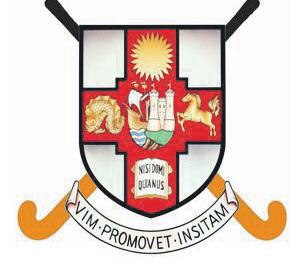
Jodie Welton
Third year, History
The 24/25 season is set to be an exciting one for UBLHC. We will be entering six teams into our BUCS competition with four also playing in a Saturday league. We also have one friendly team who play in the intramural league.
This year we hope to see success for all the teams within these leagues with several teams narrowly losing out on promotion last year and wishing to rectify this! With so many teams we are a big club and are excited to invite incoming freshers to join us.
In addition to our sporting goals, we will continue to hold the SU to their commitments on improving the welfare of students within the university’s clubs. Last year we made complaints to the SU surrounding their failure to protect a member of our club after a case of sexual assault. After which, we worked with them to amend the issues with the student code
of conduct and we are proud to have brought change to protect students not only in sport but throughout the uni.
We are a club committed to having fun first and foremost and this is of course what we intend to continue doing in the incoming season.









Mackenzie
Second year, History
My name’s Harley and I’m UBAFC’s social media sec who joined men’s football last year through the September trials. Being able to play for the official football club at the university has been an amazing opportunity, allowing me not only to represent my university but also creating a platform to meet lots of new and interesting people, within our diverse sporting community.
Last year was a rollercoaster campaign that was ultimately successful. In BUCS (British Universities and College Sports), we saw two of our six teams being promoted, with an array of great performers across all of our teams. The season also saw the beginning of the Saturday League team, a UBAFC team competing in the Hellenic Division Two West, a competitive men’s league. The team ended up winning the League Cup Final, a per-

fect way to cap off our season.
What to expect this year? Well, the club has been going from strength to strength so be sure to expect plenty more success in the coming 24/25 season, as the Saturday team is developed further, and our BUCS teams seek further promotions to even higher divisions.

Rebekah Williams
Third year, Biochemistry Libby Rowe
Second year, Law
UBNC is an ever-growing society and we are looking forward to having our best season yet! Our Head of Netball is current Team Bath Assistant Coach, Chani Wopara.
At UBNC, we have social and development teams, as well as 6 teams competing in BUCS. All the BUCS and development squads train twice a week, with matches every Wednesday. Having achieved our Gold Award for the 2024 season, we have proven our place among the teams under the Performance Sport programme, giving us access to specialised Strength and Conditioning coaching.
At UBNC, freshers aren't just first-year students; they are anyone joining the club for their first season. UBNC is fun, welcoming and you’ll build lasting friendships with students across all year groups, and create unforgettable memories both on and off-court. We offer year round sport and social events including Christmas and End of Season formals, Derby Day and we even had one of the girls representing us at Fight Night.
Over summer, we went to Valencia, for a mix of teamwork, adventure and laughter. During term time, we hold weekly socials, both drinking and alcohol free, which included hilarious themes everyone can get involved in, fun challenges and city explorations.
all areas of the university.

Liam McKenzie
Second year, Chemistry
We are Spartans, the basketball society at the University of Bristol! Whether you're a seasoned player or a beginner, we offer a vibrant and competitive environment. We proudly support three men’s and two women’s teams, host give-it-a-go sessions and our weekly Spartans League, whereby players who are not part of a team can participate.
Last year was a landmark season as we were awarded the Bristol SU Sports Team of the Year! Our men’s first team earned promotion to Western 1A. The women’s first team not only earned promotion to Western 1A undefeated, but also clinched the Conference Cup. The women’s second team also showcased their talent, finishing runner-up in both league and cup to our first team. Lastly, the men’s third team won their WEBBA league We excitedly await this season as brings challenges for all our teams! Last February we took our annual trip to Paris and in May we held our All-Star weekend which brought the whole club together plus alumni. Joining our club is more than just playing basketball; it’s about becoming part of a close-knit community that supports one another and has fun on and off the court!
Club (UBDC) is a society for all players, from beginners to oche-regulars. Darts is a social sport with no gender or age boundaries, where accuracy and the ability to keep calm under pressure are the only things that matter.
We host free practice and tournament nights on Thursdays at All Stars where equipment is available to borrow and drinks are discounted. The club have teams that compete against other universities in the University Darts UK South West division, with regular home and away fixtures throughout the year. This year we are hoping to establish a B team allowing more players to compete against other universities and are planning to attend several of UDUK’s singles tournaments held across the country.
The highlight of the year is our varsity night which takes place in the spring and allows the year’s top players to play against a rival university on stage in front of an Ally Pally-like crowd. This event has hundreds of spectators every year and we host qualifiers to assemble our team. We have a free social membership for the Thursday night sessions and a competitive membership for those who want to play in our teams.

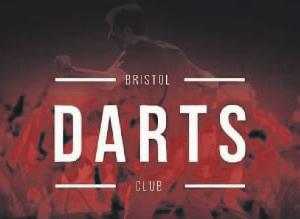
Our 1st XI have recently won the England Hockey Conference West for the second time in three years meaning they will be playing in the second tier of England Hockey in the Division 1 South league. The 2nd XI followed suit by winning their league to earn promotion to West Prem. They both compete at high standards in BUCS as well.
Our lower teams, although successful on the pitch, prioritise the enjoyment of hockey over results. These squads are perfect for anyone who may have less experience playing hockey or who have not played for a while to build up their skills, fitness, and confidence through match play.
Overall, we are an open, successful and friendly society who welcome all members of any hockey standard.

Morgan Neville Masters, History
Bristol Dance Society is beyond just a place to dance, it is a community.
With 23 classes a week, ranging from street to ballet in all levels, and specialised workshops collaborating with other societies, there is something for everyone. Classes are a place to socialise, exercise, and build skills.
In second term, classes are also a time for students to learn pieces for our annual show in March. This is both a time for our dancers to showcase their hard work, and for Dance Soc to give back to their community, where all proceeds go to two charities of the societies choice.
As well as the show, regular fund raising activities and workshops ensure that Dance Soc is
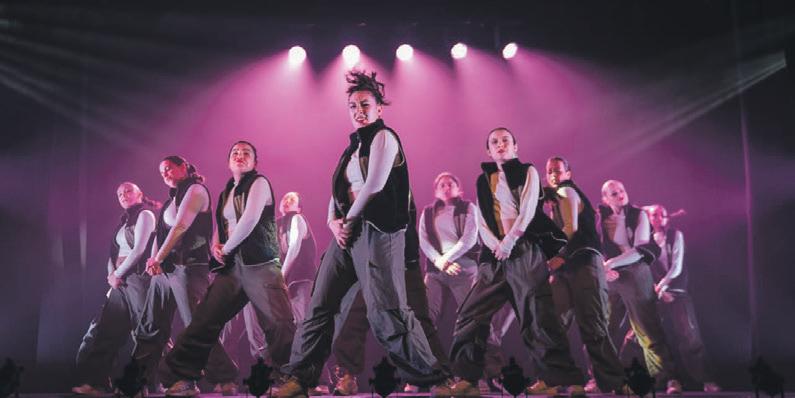
always working with the local community to contribute to charities.
There are often performance opportunities throughout the year, including guest performances at other societies balls, however, if you fancy competing, we take 10 competitive sides to nationwide
Epigram discusses future plans for University Sport with our 24/25 Student Union Sports and Development Officer
Adam Mountain Third year, History
Ella’s sporting journey at the university has been an unusual one. Accepted into the University of Bristol on a Vice-Chancellor’s sports scholarship for her rugby, Ella’s opportunities to represent the university at BUCs level were limited by covid, paving the way for her Bristol Bears career to begin. This was not always an easy task for Ella:
“Balancing rugby with university was hard, but having the support of Sports, Education and Health (SEH), the Scholarship Performance Team, and my tutors as well has been so useful.”
previous sports officers have been club captains or committee members, so I think it’s nice to have someone come in with a different perspective.”
These experiences of both elite-performance and BUCs sports are exhibited through Ella’s aims of improving university sport this upcoming year, as she reiterated that “our [SU team] priority is collective wellbeing, that being mental and physical health, while equally we will continue to work alongside SEH to support those elite-level athletes at the university.”
The University of Bristol Men’s Hockey Club is a welcoming, inclusive and open community for players of all skill levels. We field five teams that compete on Wednesdays and weekends, ranging from regional levels to a semi-professional standard. We take pride in our fun and inclusive atmosphere, with members representing
Playing for Bristol Bears ultimately capped Ella at only a few appearances for University of Bristol Women’s Rugby Football Club (UBWRFC). Not wanting her talent to go to waste, however, Ella was encouraged to ply her trade for UBWRFC in the form of coaching, an experience which certainly prepared her for the position of sports officer:
“Even though I wasn’t allowed to play for university, I loved being involved in the university set-up and I really wanted to help make a difference. There is a lot I can bring from England camps, or Bears set-ups. I know a lot of the
In this vein, one of the main goals of Ella is to introduce a university-wide sporting injuries group: “Unfortunately, I know how frustrating and lonely being injured can be, and how much it can mess up you’re university studies. So I think it is really important to bring in a support group for everyone who is injured and for these players to feel a new sense of community after your sport has been taken away from you.”
A clear example of Ella implementing something from her experiences with the Bears, she is committed to “creating specific rehabilitation spaces and sessions, as well as doing injury-friendly events, which would be accessible to all sports, at all levels. From a mental health perspective, it becomes so challenging with injuries, so we need to support that with the right wellbeing.”
These competitions include Sheffield and Manchester, where we not only win best team spirit!
Whether you’re a seasoned competition dancer or a total beginner, there’s something for you at Dance Soc.
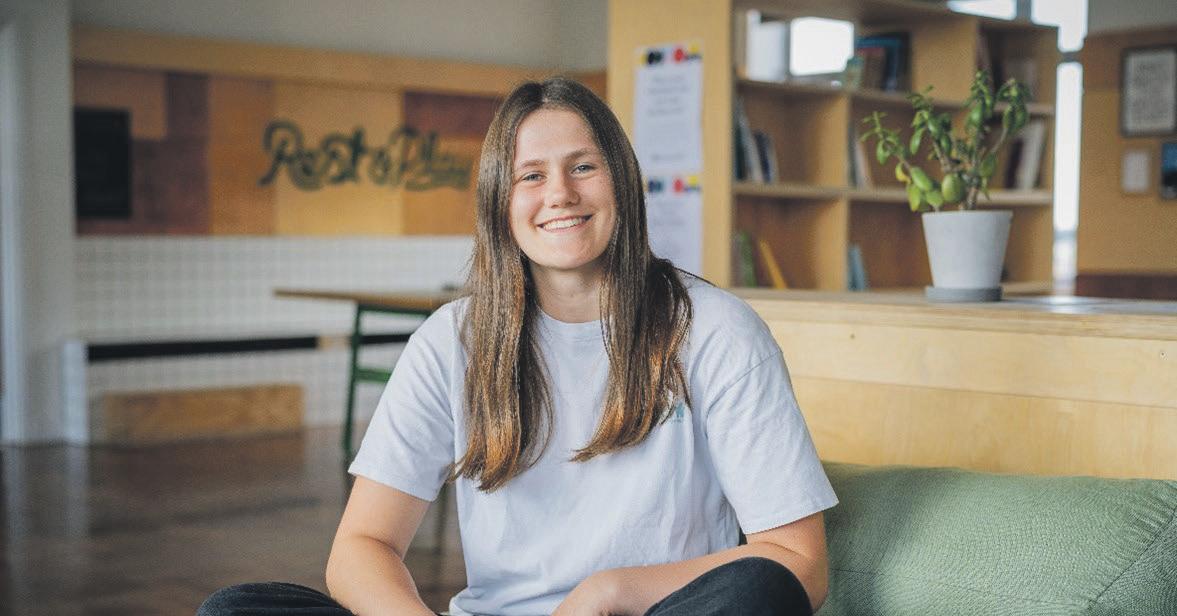
Ella was also complimentary of her sports officer predecessor, Pat Gibbs, stating that she is keen to develop “some of the projects that he couldn’t quite finish. One of these would be making a mandatory wellbeing role within all sports committees. We know that many clubs do already have a welfare secretary, but because it is not mandatory we do not know who these individuals are and can’t support them well enough.”
Last year Pat also went to great lengths to improve the Activity Hardship Fund, a grant offered by the SU to support students who would otherwise be unable to afford the numerous costs associated with university sport, such as membership fees and trips. Ella remains keen to continue this initiative too, saying that “Pat did a lot of work on the activity hardship fund and effectively tripled the pot. So we want to con-
tinue with that to increase the maximum amount a person can apply for to £200.”
Yet despite her action-packed schedule for the upcoming year, Ella understands the importance of setting time aside to interact with and learn from the students who her policies will be impacting:
“I want to be very visible, by having a good presence on campus, as well as being at Coombe [Dingle] on Wednesday afternoons. I just want to be available for anyone that wants to talk to me! I’ll be taking part in some of the give-it-a-go sessions in freshers week as a chance to get to talk to some of our new freshers. I know I’ll be doing a lot of yoga!”
So with Ella at the helm as our 2024/25 Sport and Student Development Officer,
it feels as though the Univer-
sity of Bristol’s sporting world could not be in safer hands. For both our new freshers and returning students, let this be the encouragement you need to get involved in a sport society this year, regardless of your playing level. And when you do, you can be sure that Ella will be there to roar you on.
What sport society will you be joining this year?